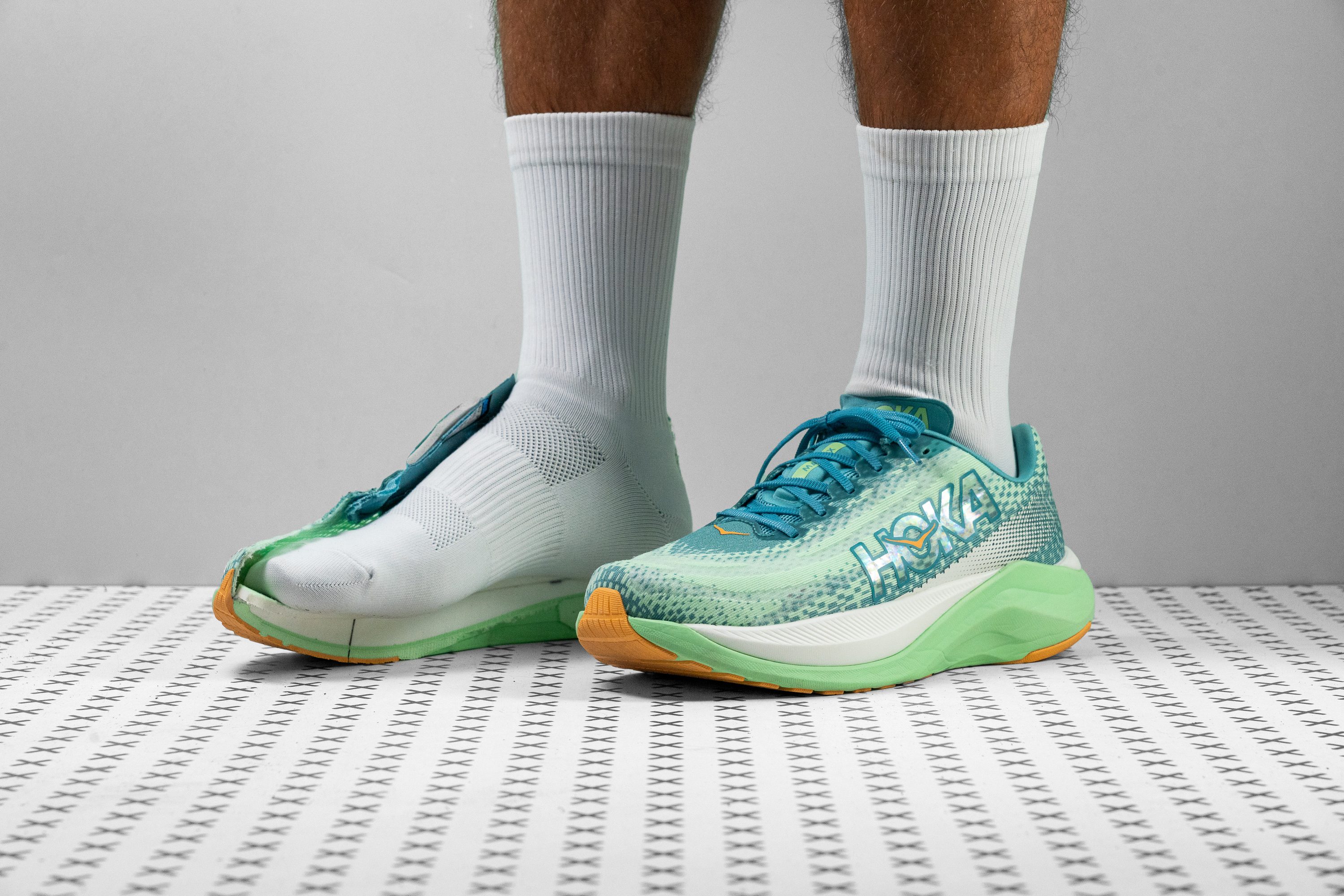Our verdict
Pros
- Lightweight and stable
- Works across all paces
- Comfortable for easy runs despite having a plate
- Finally a Hoka Mach with Pebax foam
- Well-suited for heel strikers
- Offers exceptional breathability
- Flexible and comfy despite having a plate
Cons
- Official drop measurement (5 mm) is inaccurate
- The $180 price point might be steep for some
Audience verdict
- Top 22% in Hoka running shoes
Comparison
The most similar running shoes compared
+ + Add a shoe | |||||
|---|---|---|---|---|---|
| Audience score | 89 Great! | 90 Superb! | 81 Good! | 92 Superb! | |
| Price | $180 | $200 | $190 | $150 | |
| Pace | CompetitionTempo | Daily runningTempo | Daily runningTempo | Daily runningTempo | |
| Shock absorption | High | Moderate | High | High | |
| Energy return | Moderate | High | Moderate | Moderate | |
| Traction | Moderate | High | High | High | |
| Arch support | Neutral | Neutral | Neutral | Neutral | |
| Weight lab Weight brand | 9.1 oz / 259g 9.4 oz / 266g | 8.9 oz / 252g 8.8 oz / 250g | 9.3 oz / 264g 8.9 oz / 252g | 9 oz / 254g 9 oz / 255g | |
| Drop lab Drop brand | 9.6 mm 5.0 mm | 8.2 mm 8.0 mm | 9.5 mm 5.0 mm | 7.4 mm 8.0 mm | |
| Strike pattern | HeelMid/forefoot | HeelMid/forefoot | HeelMid/forefoot | Mid/forefoot | |
| Size | Slightly small | True to size | - | True to size | |
| Midsole softness | Soft | Soft | Soft | Soft | |
| Difference in midsole softness in cold | Normal | Small | Small | Big | |
| Toebox durability | Bad | Good | Decent | Bad | |
| Heel padding durability | Bad | Good | Good | Decent | |
| Outsole durability | Good | Good | Good | Good | |
| Breathability | Breathable | Breathable | Moderate | Moderate | |
| Width / fit | Narrow | Medium | Narrow | Medium | |
| Toebox width | Medium | Medium | Narrow | Medium | |
| Stiffness | Moderate | Stiff | Stiff | Moderate | |
| Torsional rigidity | Stiff | Stiff | Stiff | Stiff | |
| Heel counter stiffness | Moderate | Moderate | Flexible | Moderate | |
| Rocker | ✓ | ✓ | ✓ | ✓ | |
| Heel lab Heel brand | 38.0 mm 39.0 mm | 42.8 mm 45.0 mm | 42.9 mm 44.0 mm | 40.9 mm 41.5 mm | |
| Forefoot lab Forefoot brand | 28.4 mm 34.0 mm | 34.6 mm 37.0 mm | 33.4 mm 39.0 mm | 33.5 mm 33.5 mm | |
| Widths available | Normal | NormalWide | NormalWide | NormalWide | |
| Orthotic friendly | ✓ | ✓ | ✓ | ✓ | |
| Season | SummerAll seasons | SummerAll seasons | All seasons | All seasons | |
| Removable insole | ✓ | ✓ | ✓ | ✓ | |
| Ranking | #225 Top 33% | #78 Top 21% | #294 Bottom 23% | #15 Top 4% | |
| Popularity | #301 Top 44% | #25 Top 7% | #110 Top 29% | #7 Top 2% |
Who should buy
The Hoka Mach X is perfect for us runners who:
- Want a versatile shoe that can tackle a wide range of running paces.
- Are looking for a tempo training shoe packed with incredible bounce and energy return.
- Seek a lightweight option that bridges the gap between a daily trainer and a race shoe.
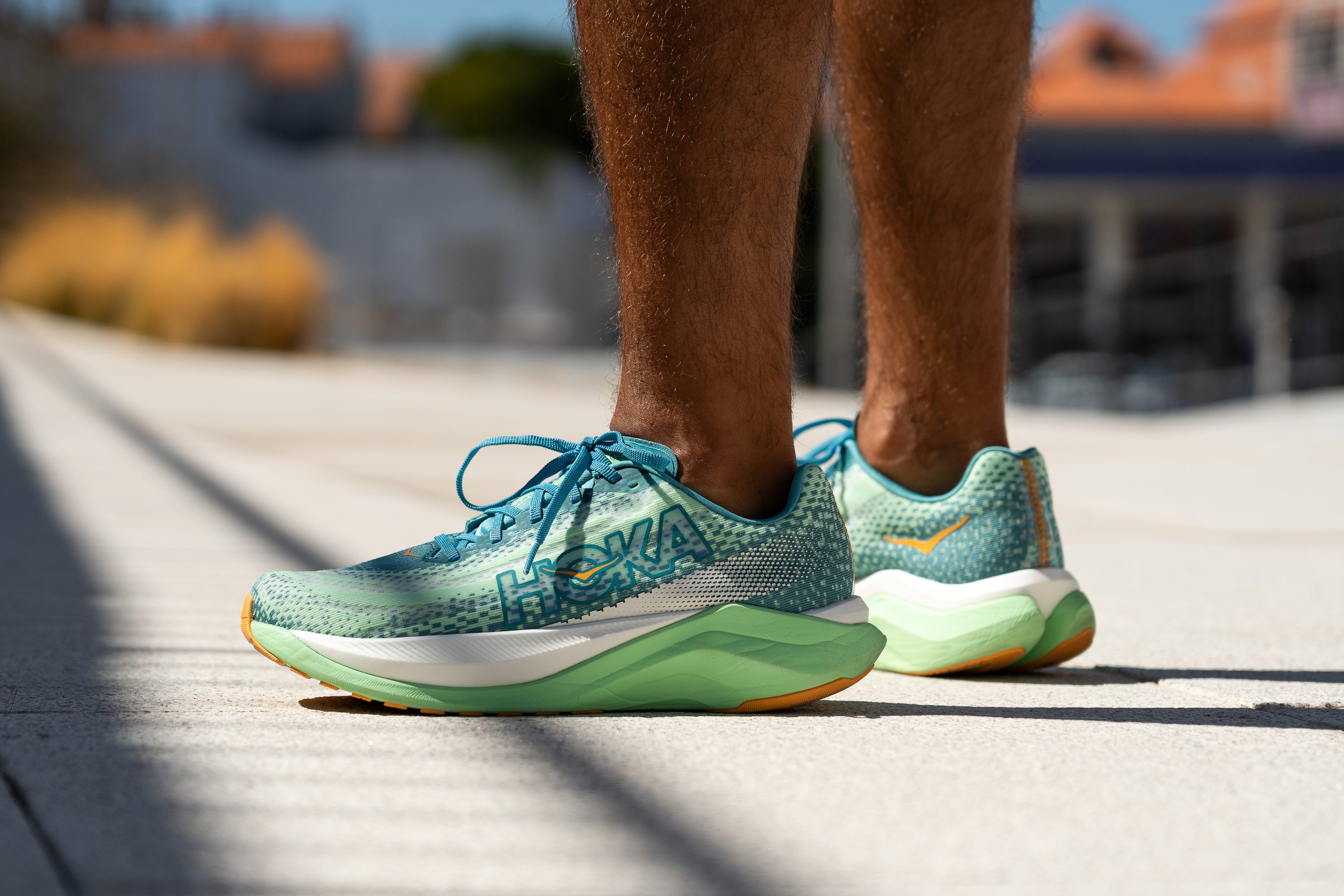
Who should NOT buy
While Hoka aimed to cater to a wide audience with the Mach X design, it might not resonate with every runner.
We noticed the shoe's dual-layer midsole, made of a soft Pebax foam (white) with a firmer EVA foam (green), might feel uncomfortable to some. If you're looking for a daily trainer that offers a bouncy feel with a full layer of premium Pebax foam, we recommend the Endorphin Speed 3, as it provided us a more consistent and enjoyable ride.
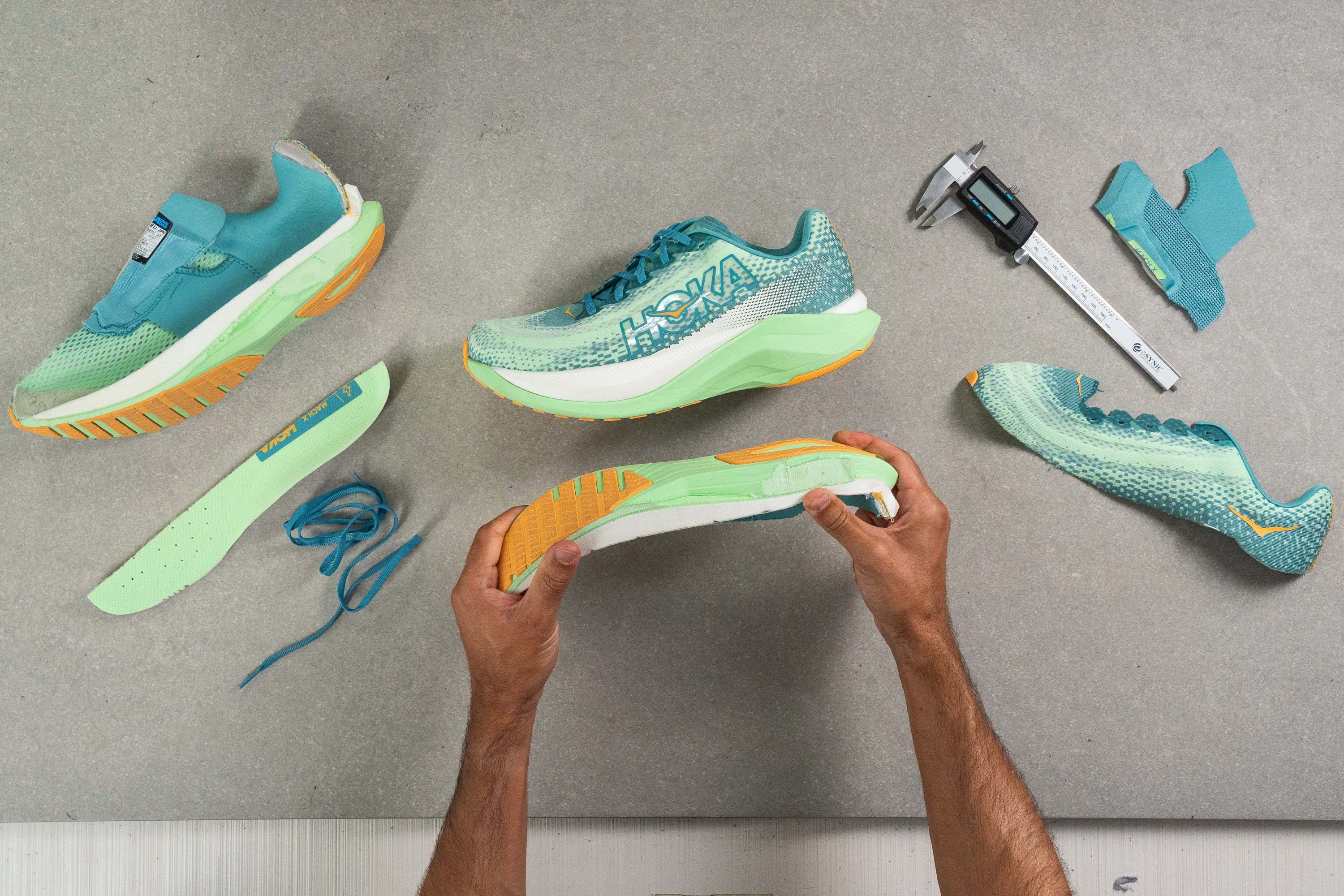
If you favor tempo trainers without a plate and appreciate ground feel, the Nike Streakfly might be your ideal choice. And if you want a non-plated Hoka for tempo training, check the Hoka Mach 5 instead.
Cushioning
Shock absorption
If you’re eyeing the Mach X for long runs, you’re on the right track. It delivers excellent shock absorption with 132 SA in the heel and 113 SA in the forefoot.
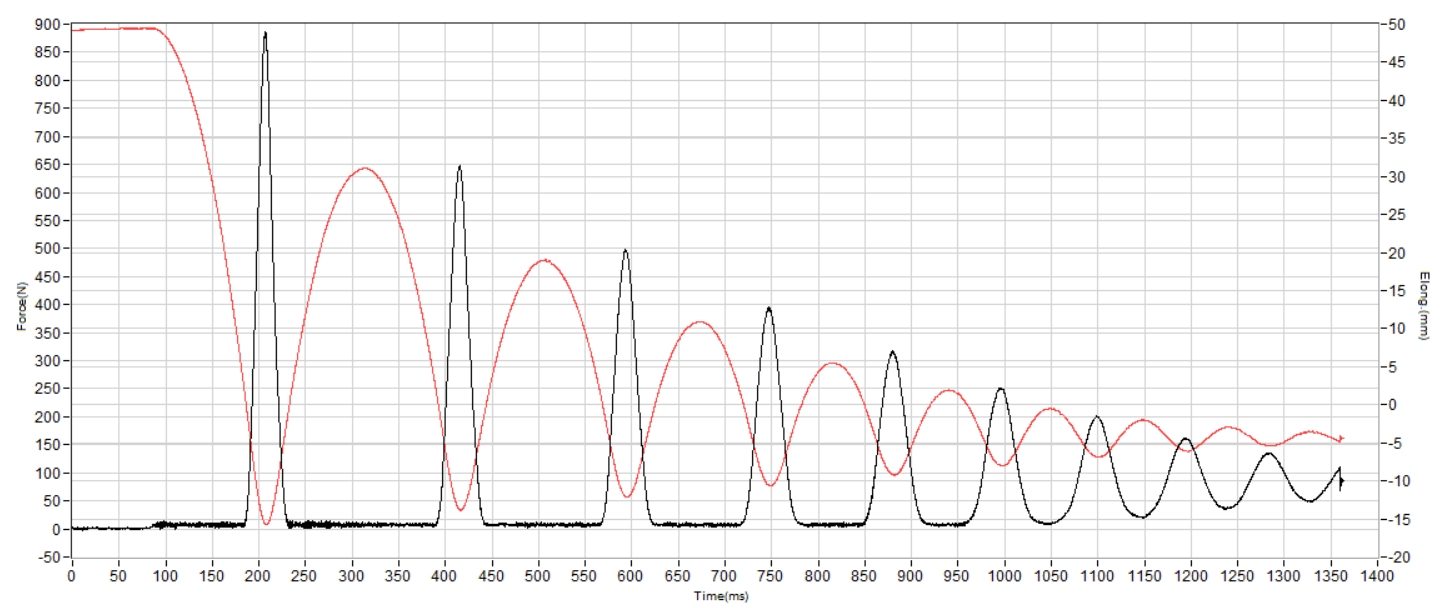
| Hoka Mach X | 132 SA |
| Average | 130 SA |
Energy return
The heel delivered a modest 60.7% energy return, which makes sense since it features more EVA than the forefoot. That’s why things improved in the front section—once the premium PEBA foam took over, energy return jumped to a stronger 68.8%.
| Hoka Mach X | 60.7% |
| Average | 58.6% |
Heel stack
Building on that maximalist approach, the Hoka Mach X boasts a generous 38 mm of foam in the heel.
This makes it one of the market's most cushioned tempo shoes, making it an ideal choice for heel strikers.
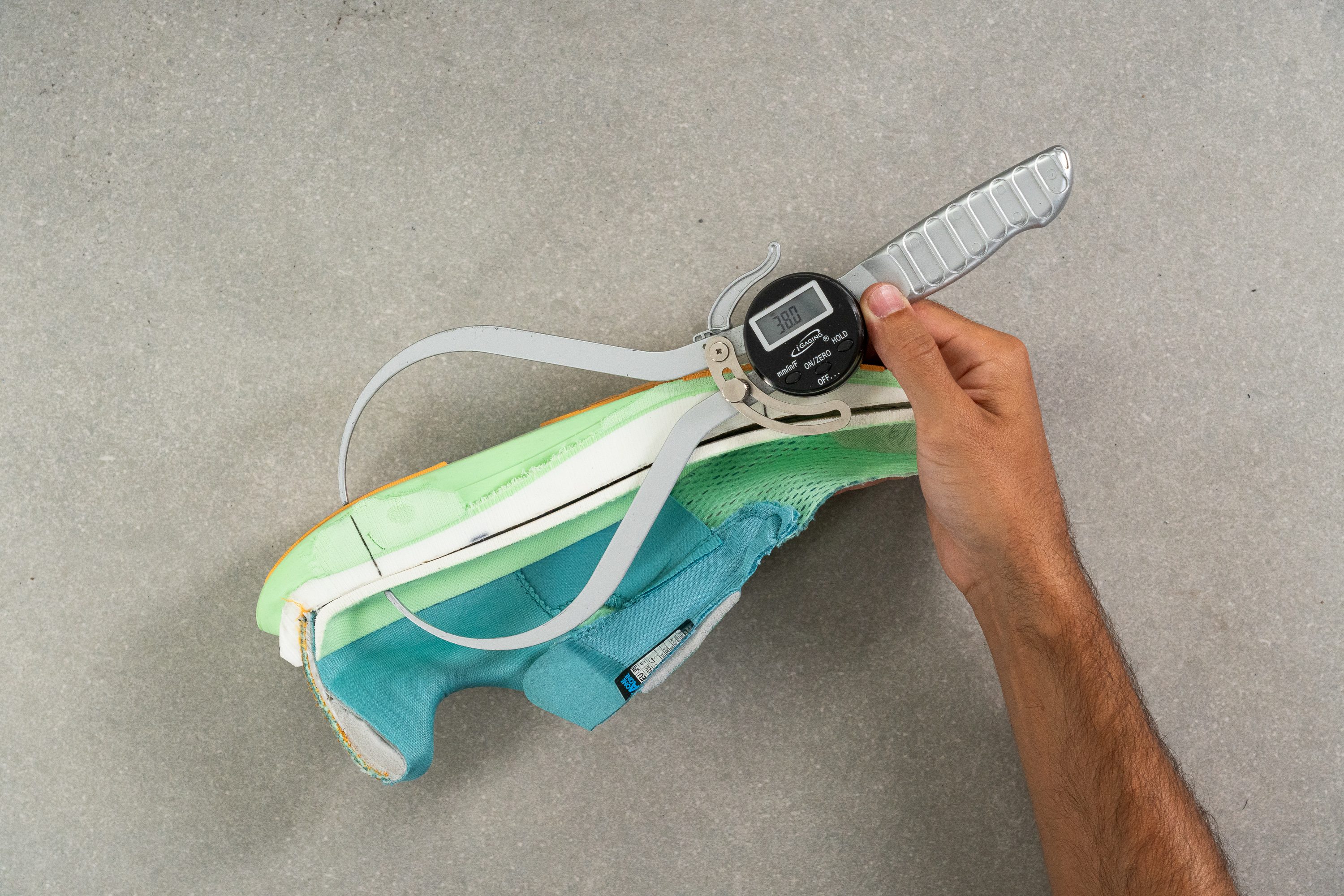
| Hoka Mach X | 38.0 mm |
| Average | 34.8 mm |
Forefoot stack
The forefoot also boasts a generous amount of foam, measuring at 28.4 mm. This ensures that both midfoot and forefoot strikers can confidently tackle even the longest runs without concern.
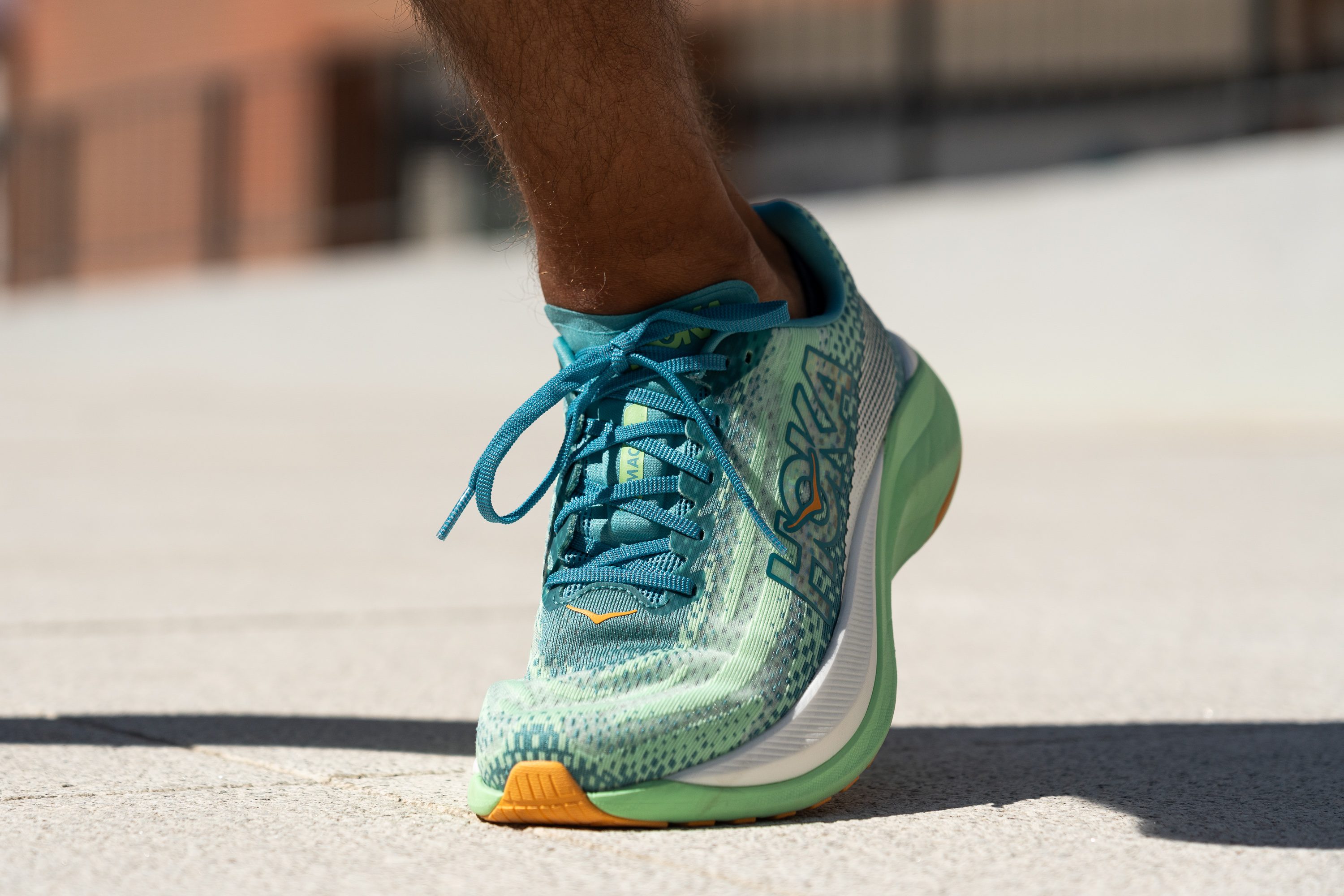
However, this shoe doesn't offer much in terms of ground feel. If you're looking for a tempo training shoe with that capability, consider the Adidas Adizero Adios 8.
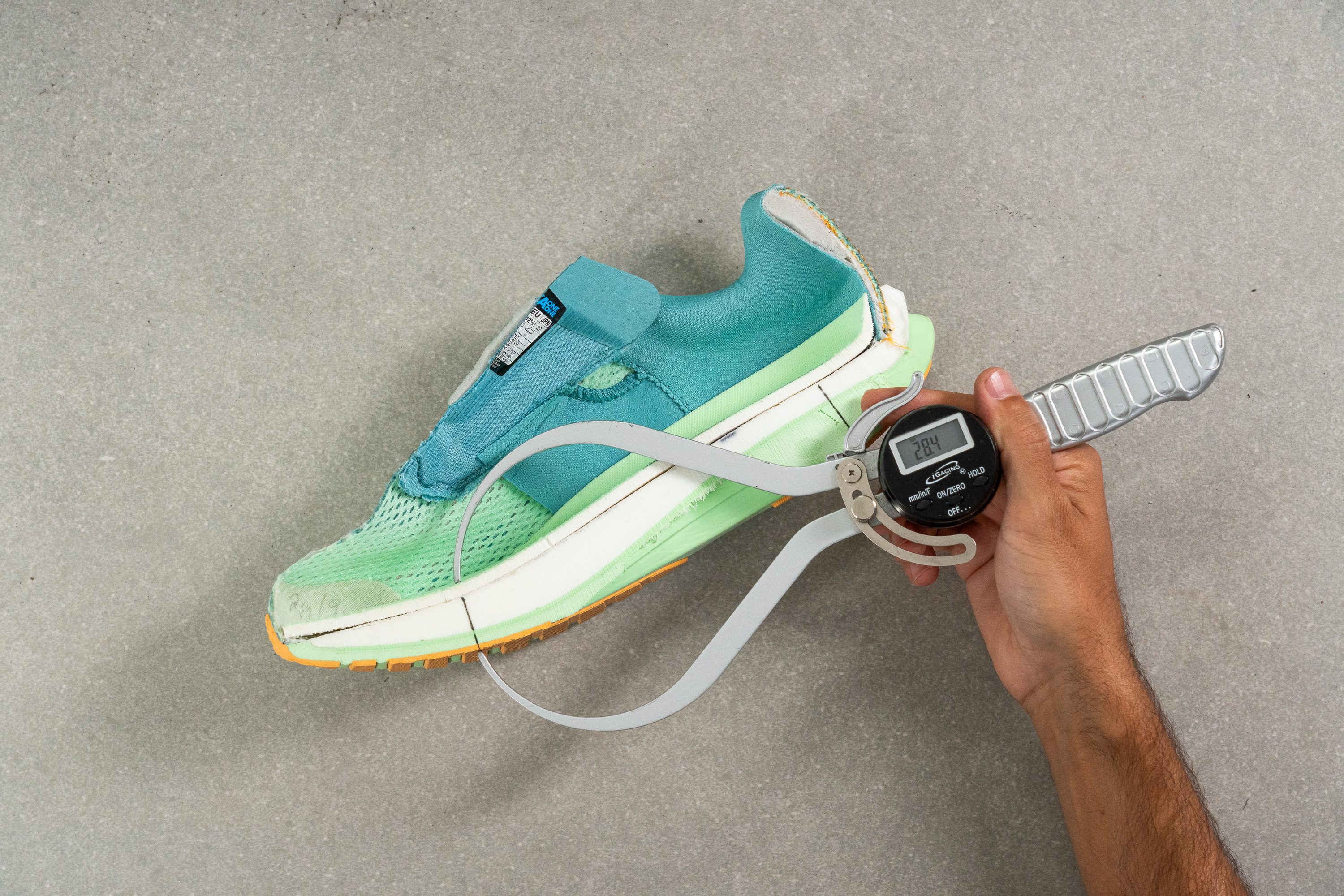
| Hoka Mach X | 28.4 mm |
| Average | 26.2 mm |
Drop
Hoka advertises the Mach X with a 5-mm heel-to-toe drop. Yet, our in-depth assessment showed a significantly higher 9.6-mm drop.
What's behind this huuuge variance? We've explored this topic in a detailed article for those eager to understand. And it's crucial to note that our testing methods meet World Athletics standards to the letter, so we hope brands like Hoka start aiming for the same level of accuracy!
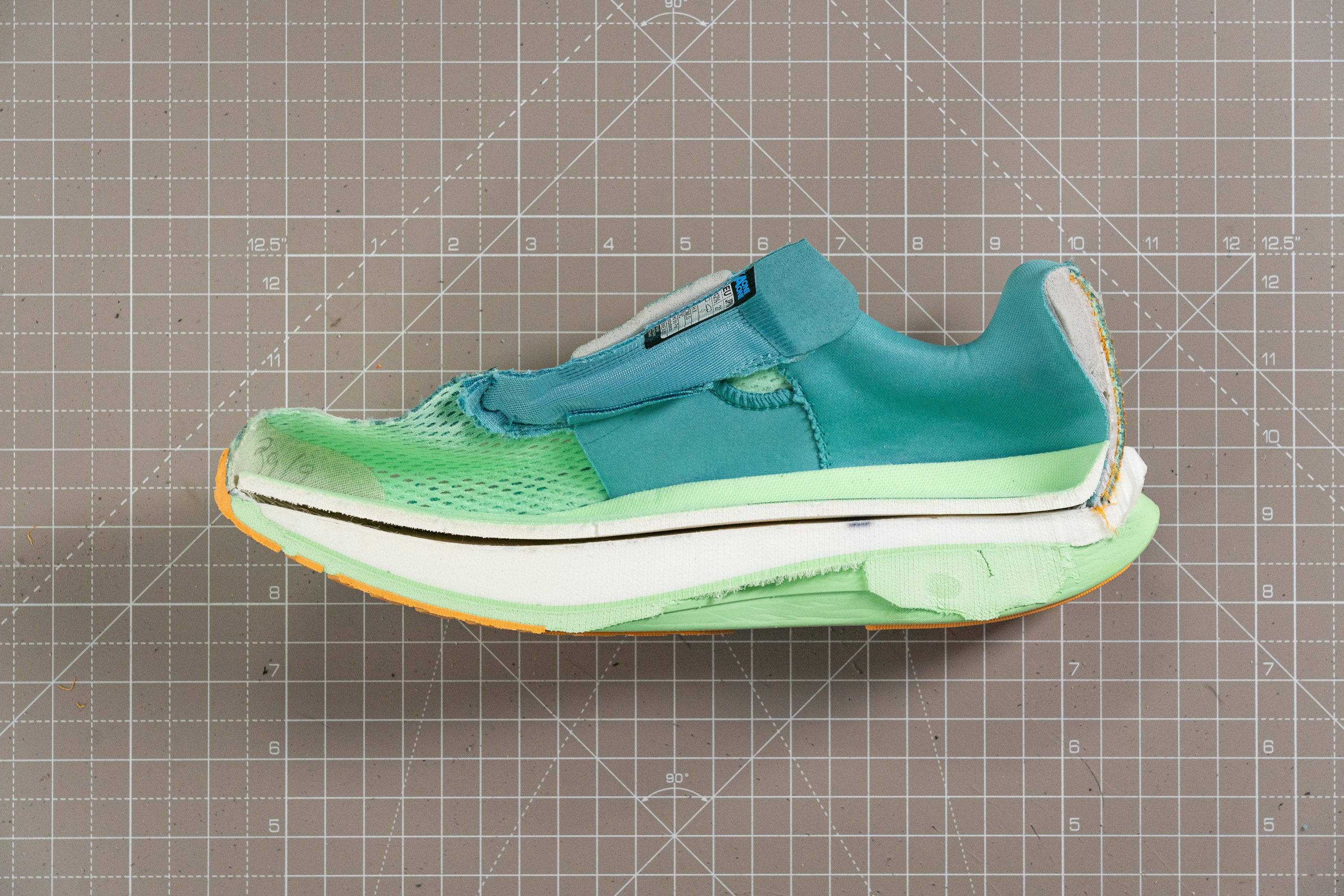
| Hoka Mach X | 9.6 mm |
| Average | 8.6 mm |
Midsole softness
Let's dive into the standout feature of this shoe—the dual-layer midsole. On the layer closest to our feet, this Hoka finally features a Pebax-based foam. This is a major step up from the EVA-based Hoka ProFly.
This foam is on par with top-tier options like ZoomX and Lightstrike Pro, offering world-class performance and an impressively bounce. We were also surprised by its exceptional softness, with our tests showing a 10.6 HA on the durometer.
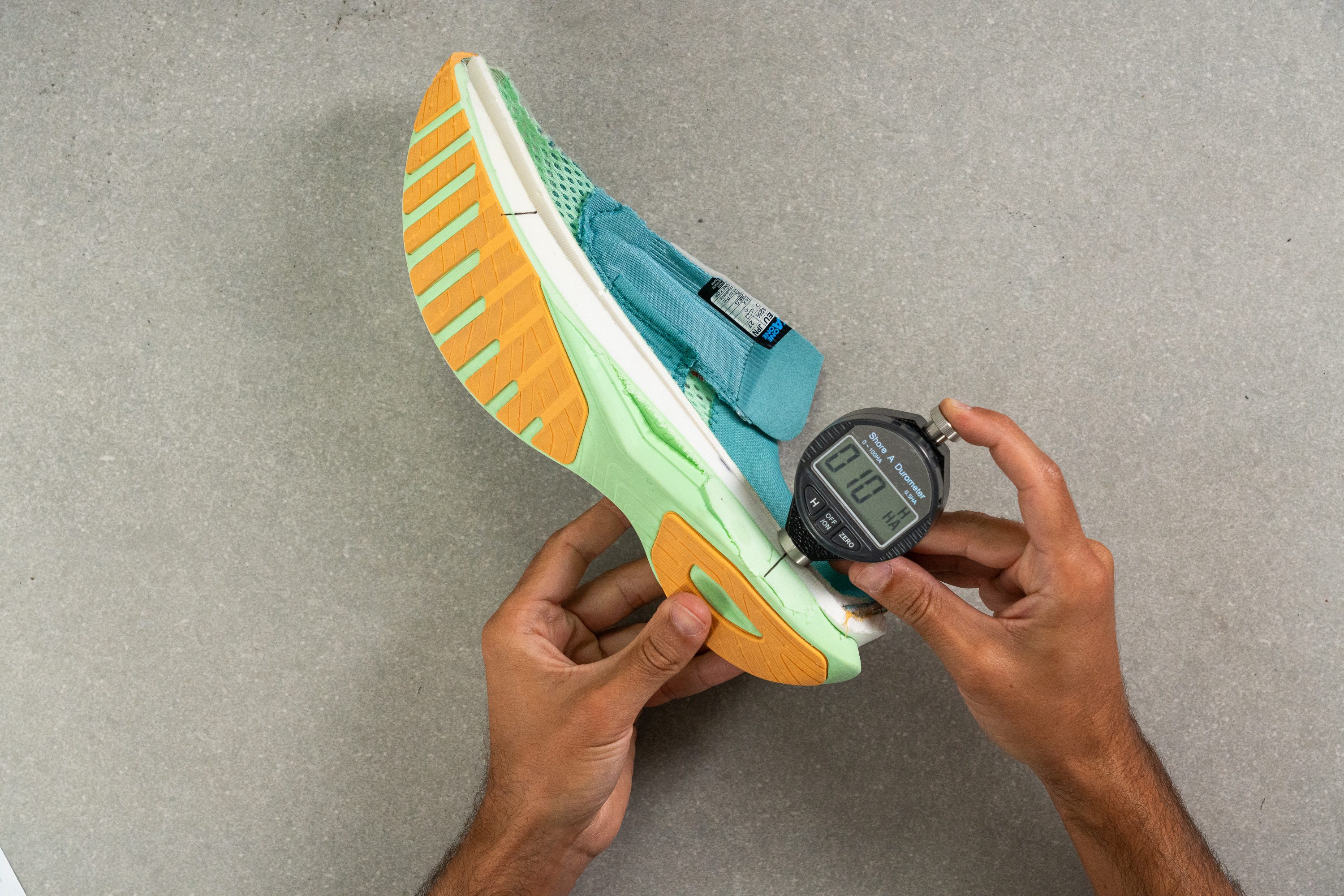
| Hoka Mach X | 10.6 HA |
| Average | 20.4 HA |
Secondary foam
For the layer nearer to the ground, Hoka chose a standard EVA foam.
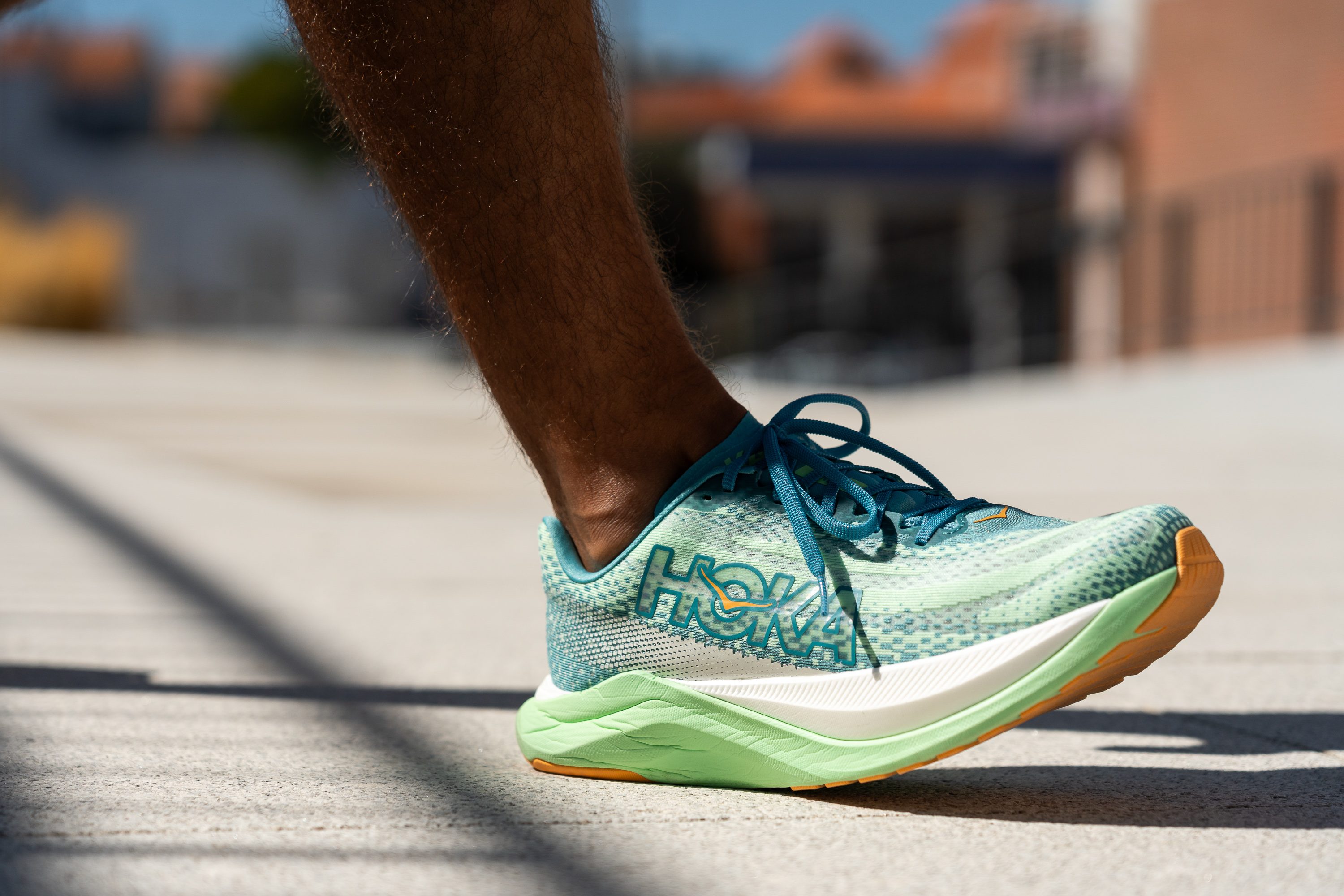
This decision achieves two objectives. First, it makes the shoe more stable since the foam is firmer than the Pebax foam, coming in at 20.0 HA. Second, it allows Hoka to reduce costs because EVA is less expensive than Pebax.
However, at $180 a pair, we have to ask: is this decision padding our comfort or just Hoka's bank account?
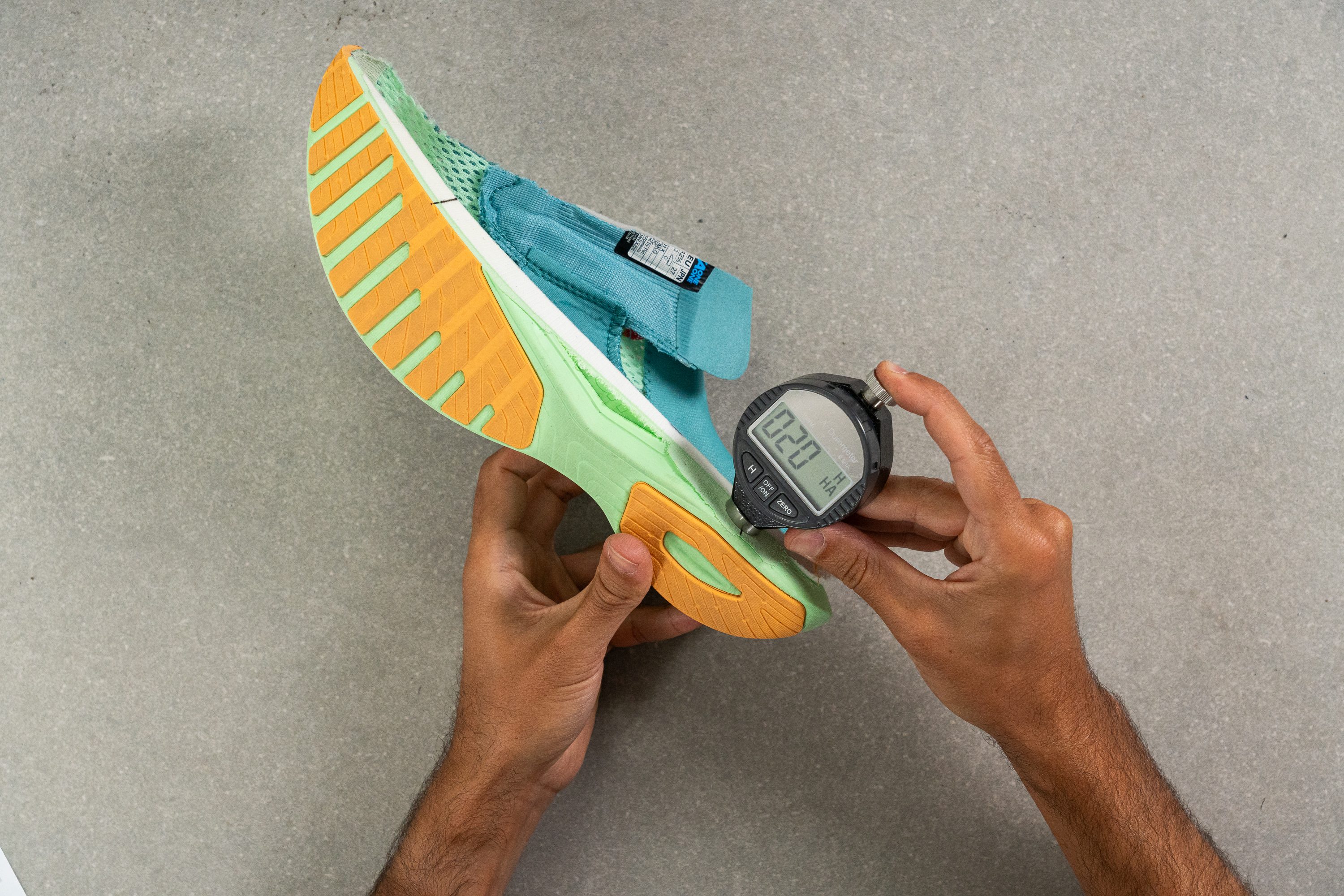
| Hoka Mach X | 20.0 HA |
| Average | 22.7 HA |
Size and fit
Size
Hoka Mach X fits slightly small (51 votes).
Internal length
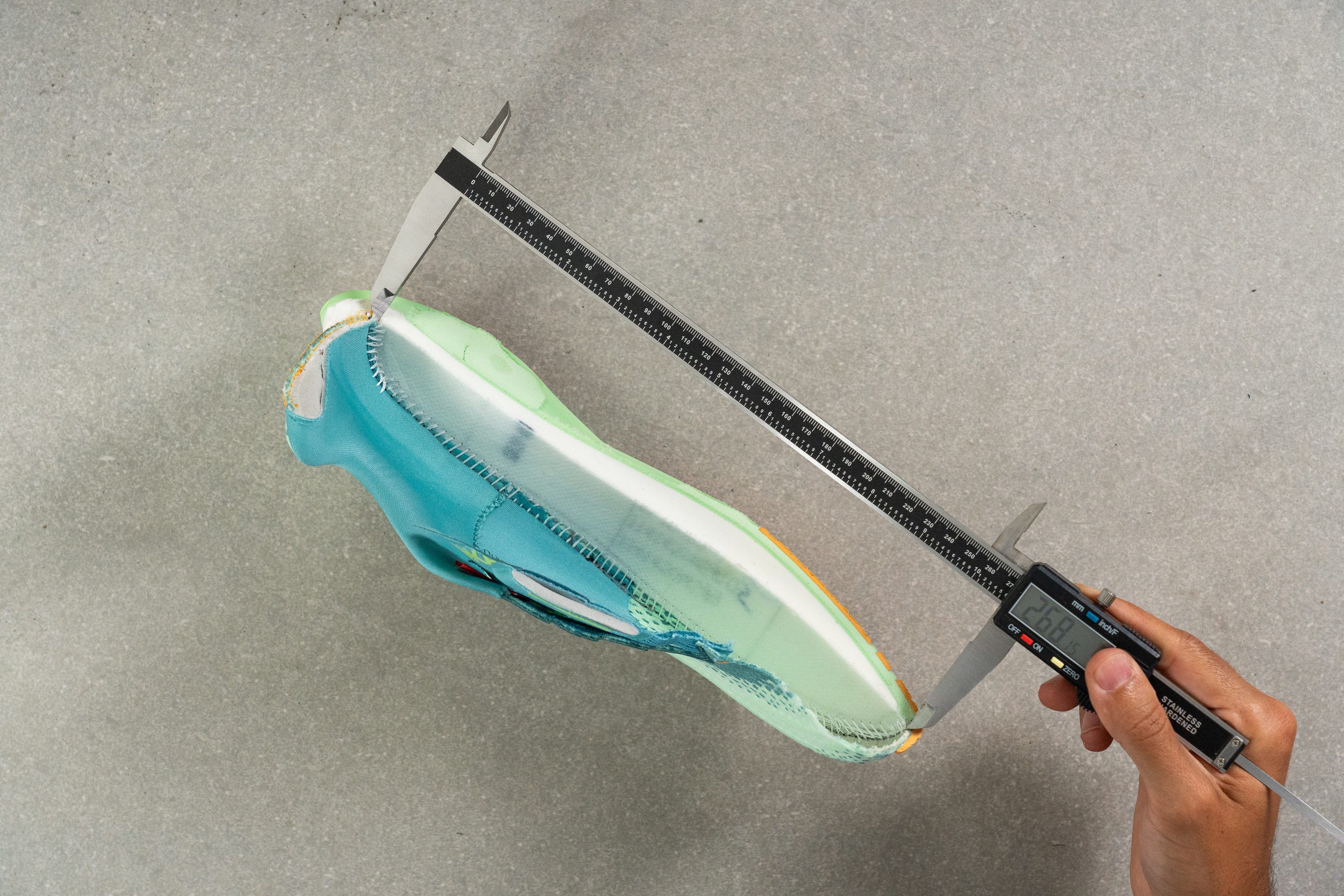
| Hoka Mach X | 268.2 mm |
| Average | 269.4 mm |
Toebox width - widest part
The toebox strikes a notable balance. It isn't as wide as the toeboxes on daily trainers like the Adidas Ultraboost Light, but it doesn't have an overly snug fit either. This comfortable middle ground lets you tackle both long runs and quick reps with ease.
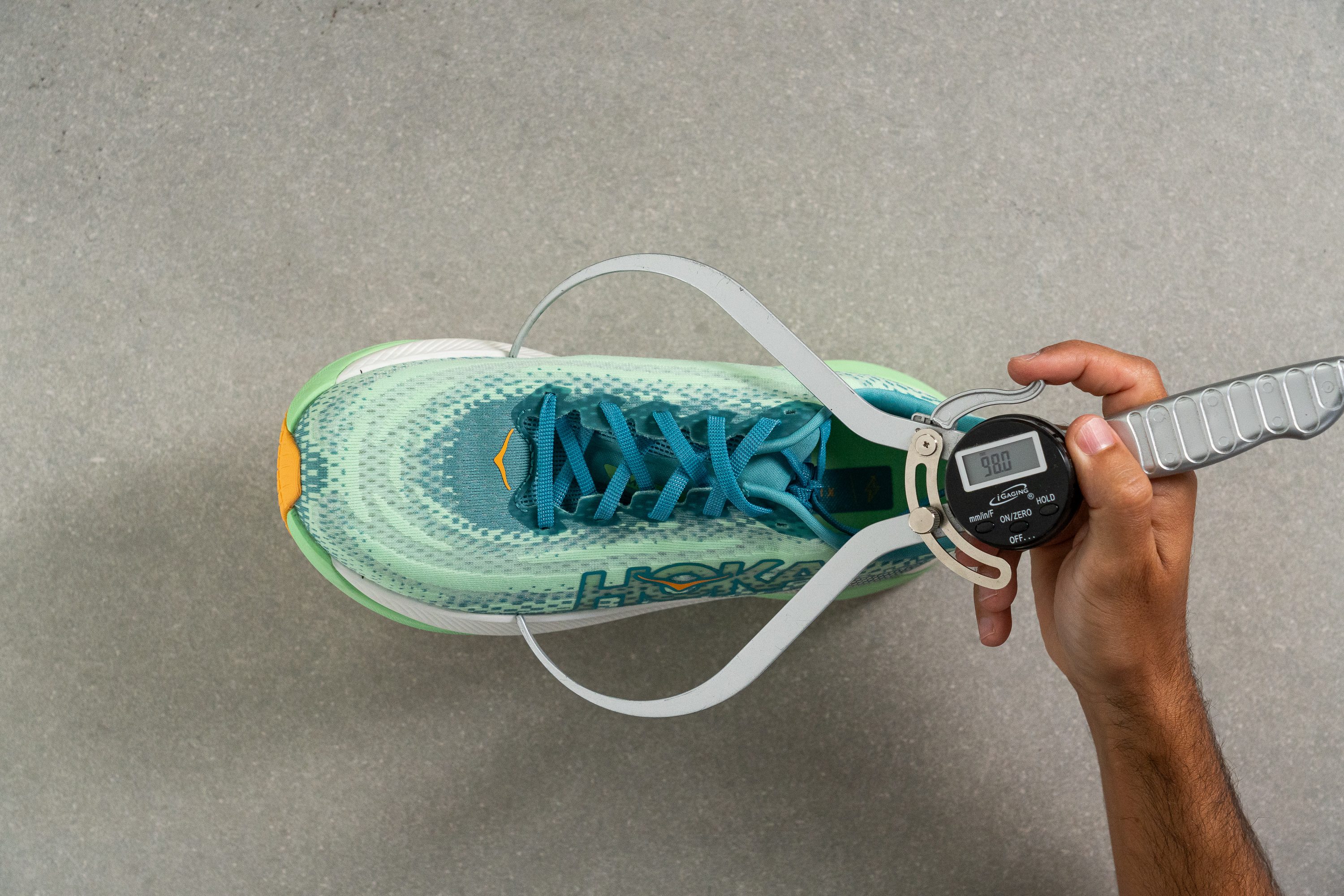
This test follows an older methodology, which is why you don't see recently tested shoes in the chart. Results from different methodologies can not be compared.
| Hoka Mach X | 98.0 mm |
| Average | 98.5 mm |
Toebox width - big toe
This trend continues in the big toe area. We measured a width of 76.6 mm, which seems suitable for most feet. However, it's worth noting that Hoka currently doesn't offer wide sizing for this shoe, so if you have wide feet, consider sizing up.
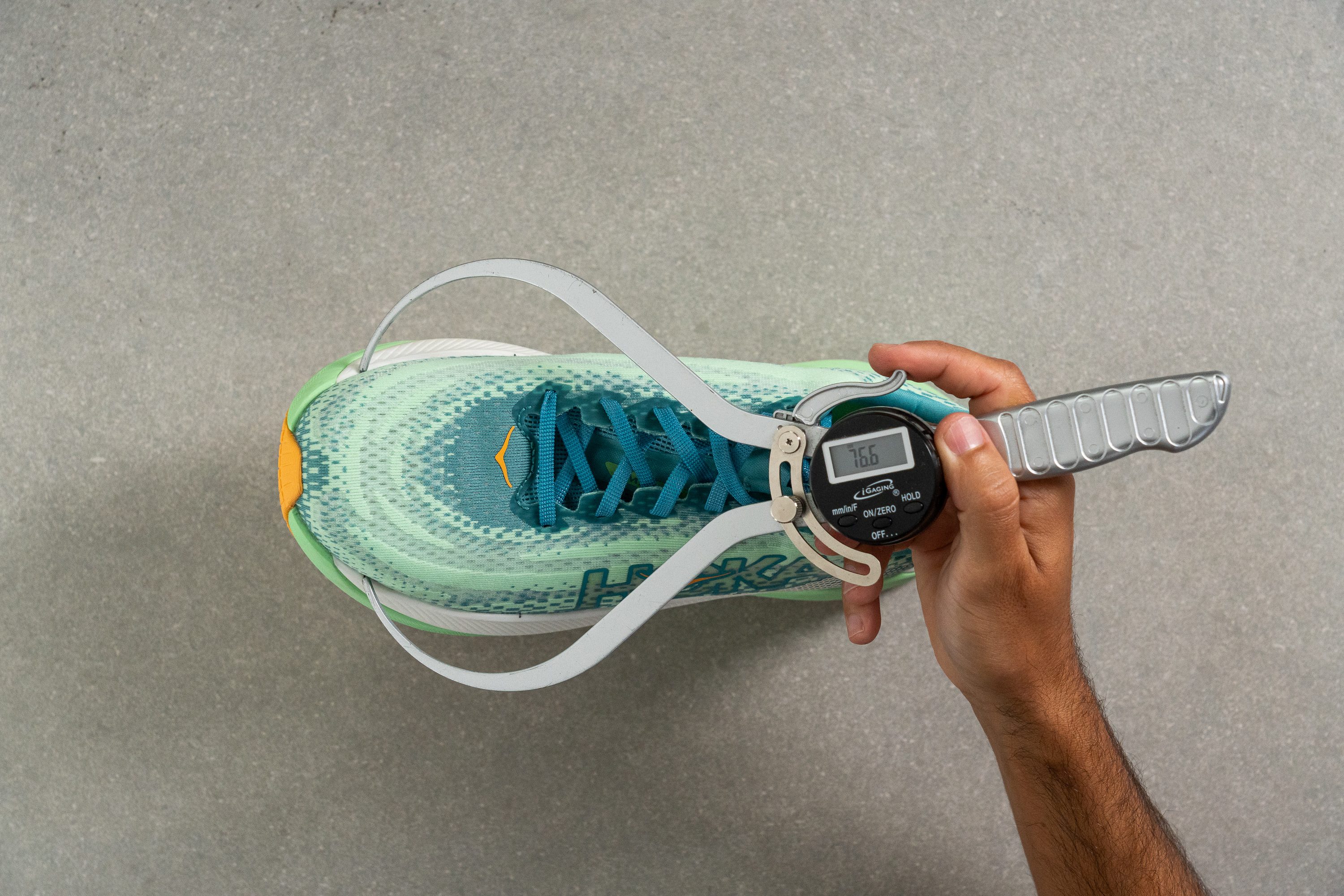
This test follows an older methodology, which is why you don't see recently tested shoes in the chart. Results from different methodologies can not be compared.
| Hoka Mach X | 76.6 mm |
| Average | 78.4 mm |
Traction / Grip
Traction test
Traction isn’t disappointing, with a 0.39 score indicating solid grip on dry surfaces and passable control in light rain. It’s dependable enough for damp runs—but for a premium-priced running shoe, we expected a slightly higher-performing compound in wet conditions.
| Hoka Mach X | 0.39 |
| Average | 0.49 |
Outsole design
The HOKA Mach X features partial rubber coverage, focusing on high-wear areas at the heel and forefoot. The rubber is arranged in flat, angular segments with big grooves to reduce weight and enhance flex.
The rest of the outsole exposes the green foam, with a big central channel running from heel to midfoot.
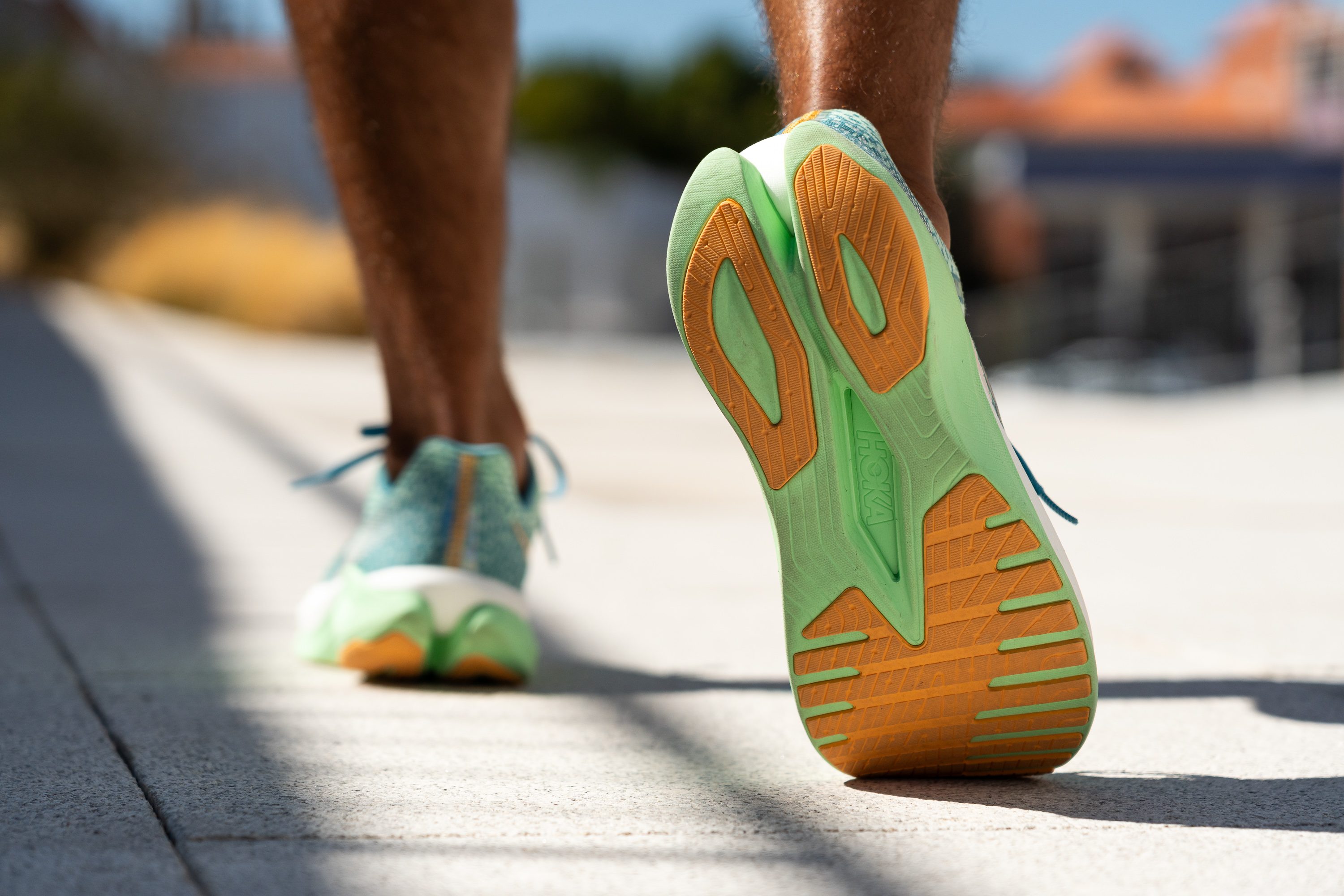
Flexibility / Stiffness
One concern we often have when testing a plated shoe is its potential stiffness for daily runs or tempo training. Yet, bending this shoe to 30 degrees requires only 13.1N of force—a surprisingly low amount. This is promising as it proves the shoe can also serve well for easy runs.
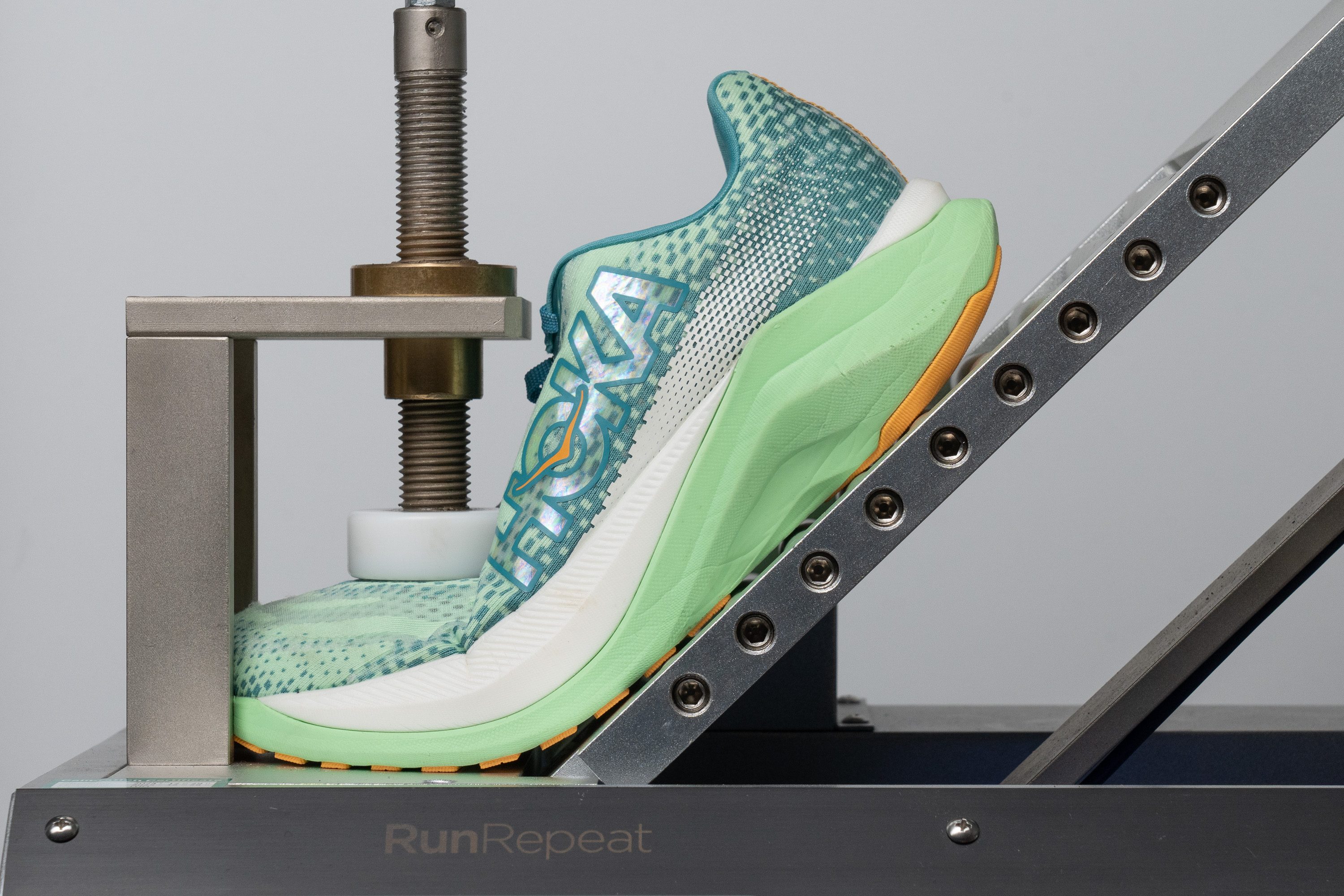
| Hoka Mach X | 13.1N |
| Average | 15.4N |
Weight
Weighing in at just 9.1 oz (259g), Hoka truly mastered the art of lightness. We could barely sense the shoe on our feet!
Despite its wide design and maximalist stance, it is so incredibly light.
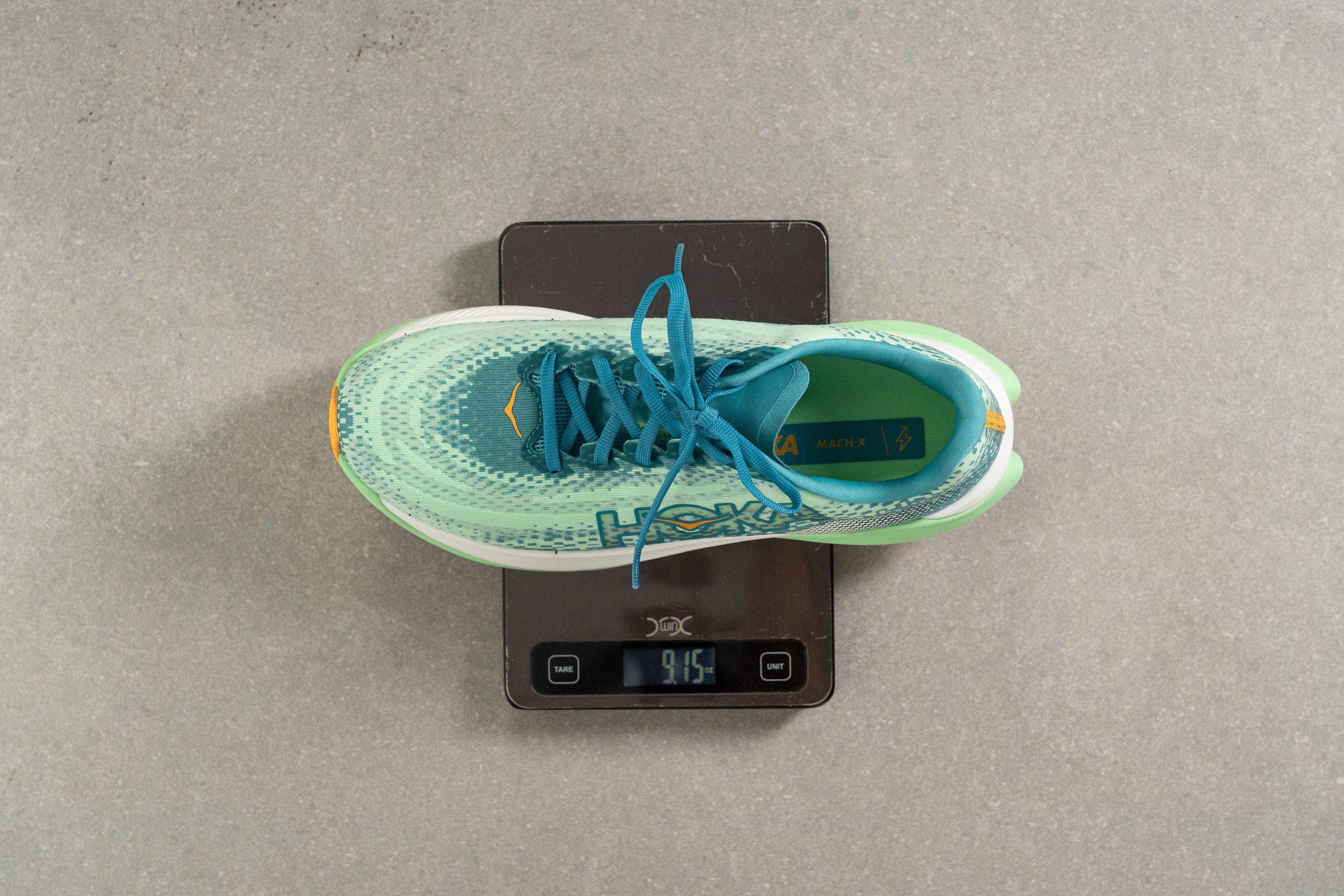
| Hoka Mach X | 9.1 oz (259g) |
| Average | 9.3 oz (264g) |
Breathability
We're kicking off this review on a high note—the breathability in the Hoka Mach X is top-notch, showing marked improvement from the Mach 5. In our lab, we awarded this shoe a perfect score of 5/5 after using our smoke-pumping machine for testing.
Seeking additional confirmation, we turned to the light test. Here, we assess the shoe's breathability and check for any ventilation holes in the upper.
With the Mach X, Hoka's use of jacquard mesh showcases numerous ventilation holes. Light shines through effortlessly—a feature we rarely observe in most training shoes.
To get an in-depth look at these holes, let's take the microscope.
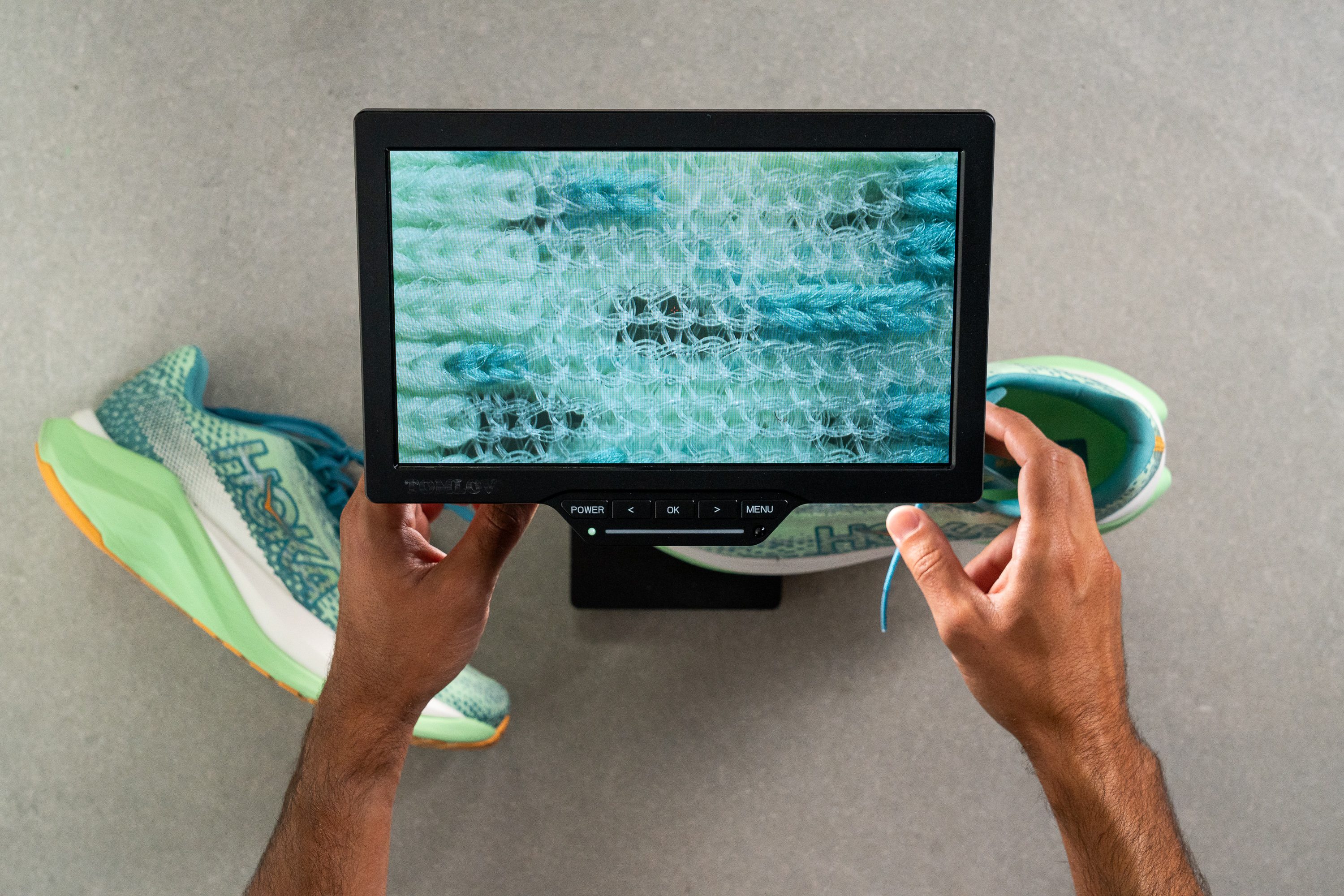
Through the lens, we gained a comprehensive understanding of Hoka's upper design. There's a standard layer filled with multiple ventilation holes, paired with a translucent structure layer—this might be invisible to the naked eye, but it stands out clearly under microscopic examination, right?
| Hoka Mach X | 5 |
| Average | 3.7 |
Stability
Lateral stability test
Despite the Mach X's thick midsole, it offers surprising stability!
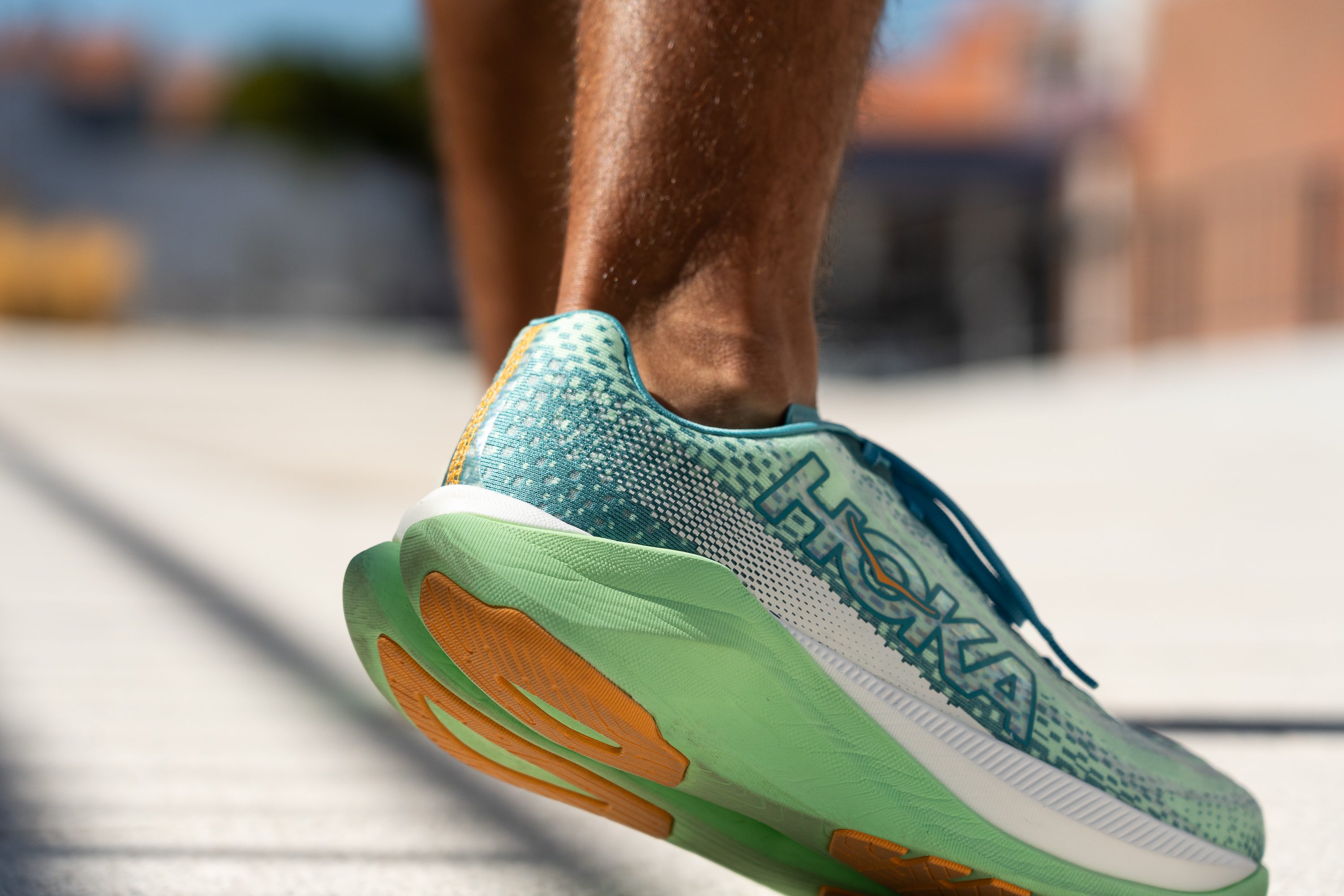
This stability can be partially credited to the EVA sidewalls Hoka incorporated, as depicted in the image above. But there's much more to it.
Torsional rigidity
The Mach X—indicated by the "X" in its name, which Hoka uses to signal a plated shoe—features a Pebax plate. Instead of opting for a carbon plate, which can add a lot of stiffness, Hoka smartly chose Pebax to ensure both stability and responsiveness. And it works.
As a result, the shoe earns a 4/5 in our torsional rigidity test. With a carbon plate, it probably have been a max score.
| Hoka Mach X | 4 |
| Average | 3.5 |
Heel counter stiffness
The heel counter is moderately firm, sitting right in the middle—it's neither too stiff nor too soft.
For a tempo training shoe, we see this as a good choice. It provides stability without sacrificing comfort, being a 3/5 in our scale. And we also loved the fact that is really padded.
| Hoka Mach X | 3 |
| Average | 2.9 |
Midsole width - forefoot
The forefoot provides ample width, ensuring a fun and safe running experience. We measured it at 113.7 mm, which is close to the average.
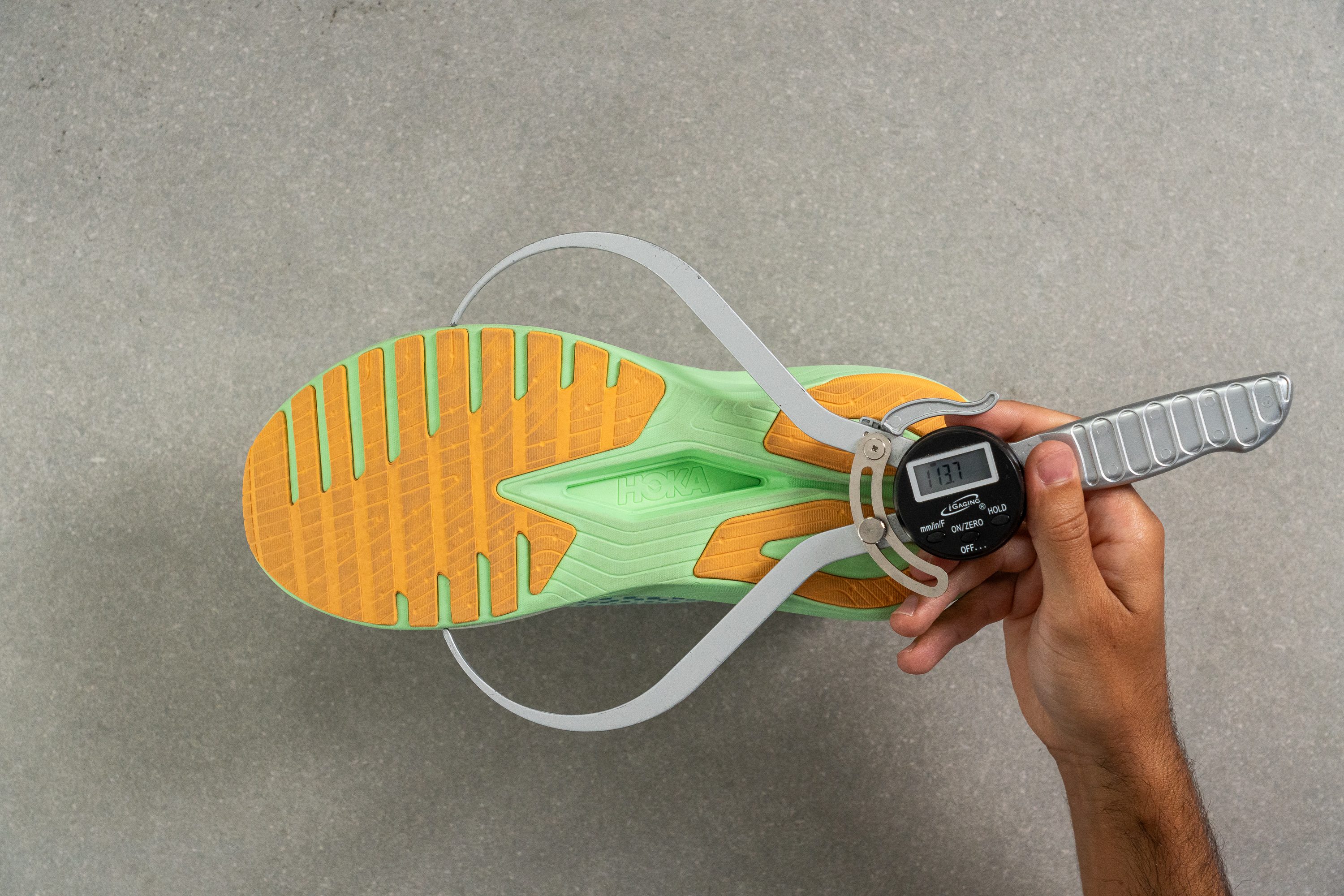
| Hoka Mach X | 113.7 mm |
| Average | 114.4 mm |
Midsole width - heel
The heel boasts an extra-wide design measuring 95.9 mm. While forefoot and midfoot strikers might find it wider than necessary, heel strikers will appreciate this feature.
In fact, this measurement—paired with the sidewalls and plate—transforms it into a top-notch tempo shoe for heel strikers.
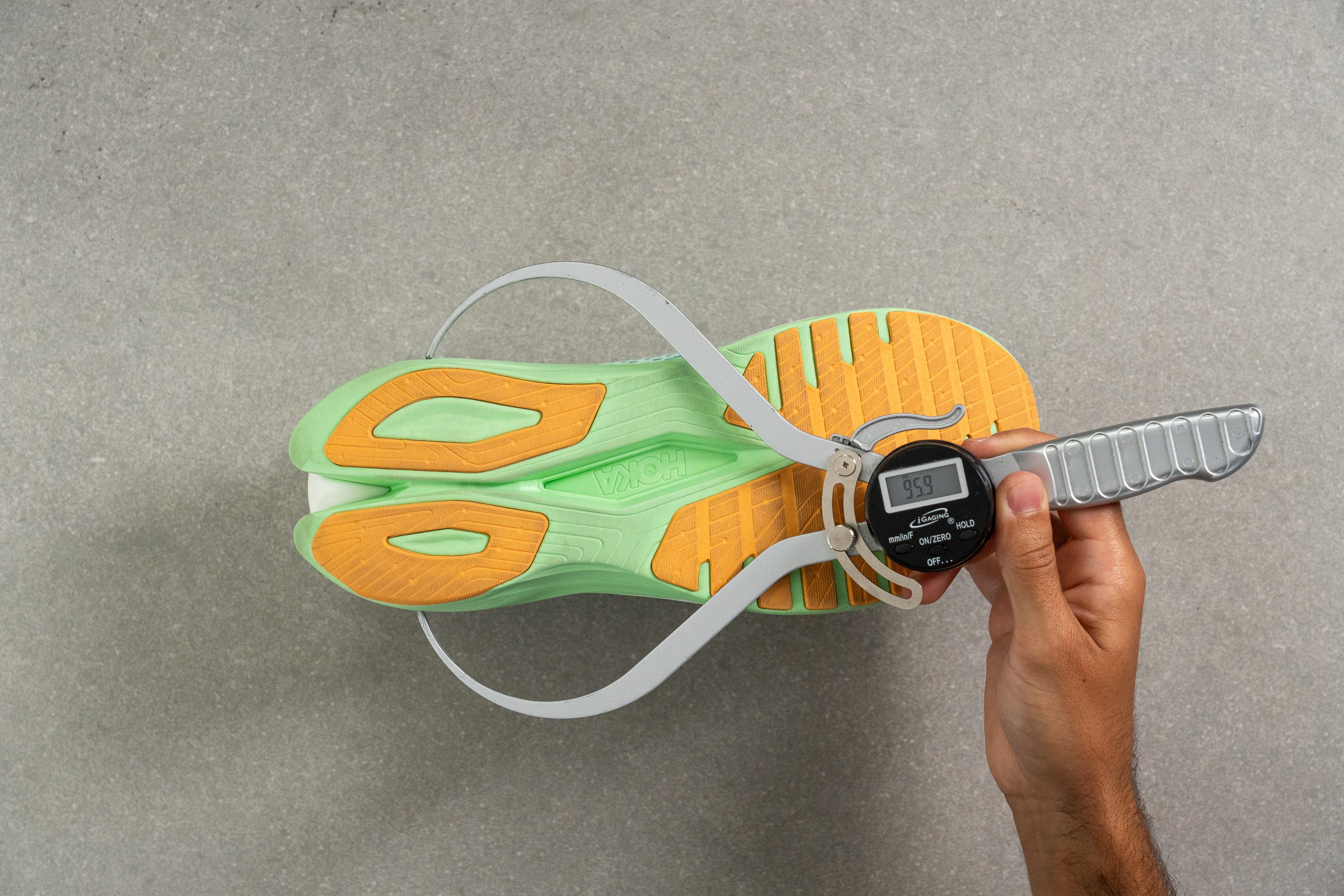
| Hoka Mach X | 95.9 mm |
| Average | 90.6 mm |
Durability
Toebox durability
After handling the jacquard mesh Hoka incorporated into the upper, we were skeptical about its long-term wear. Our suspicions were confirmed.
In our Dremel test, the upper was destroyed. Consequently, we had no choice but to give it a discouraging 1/5.
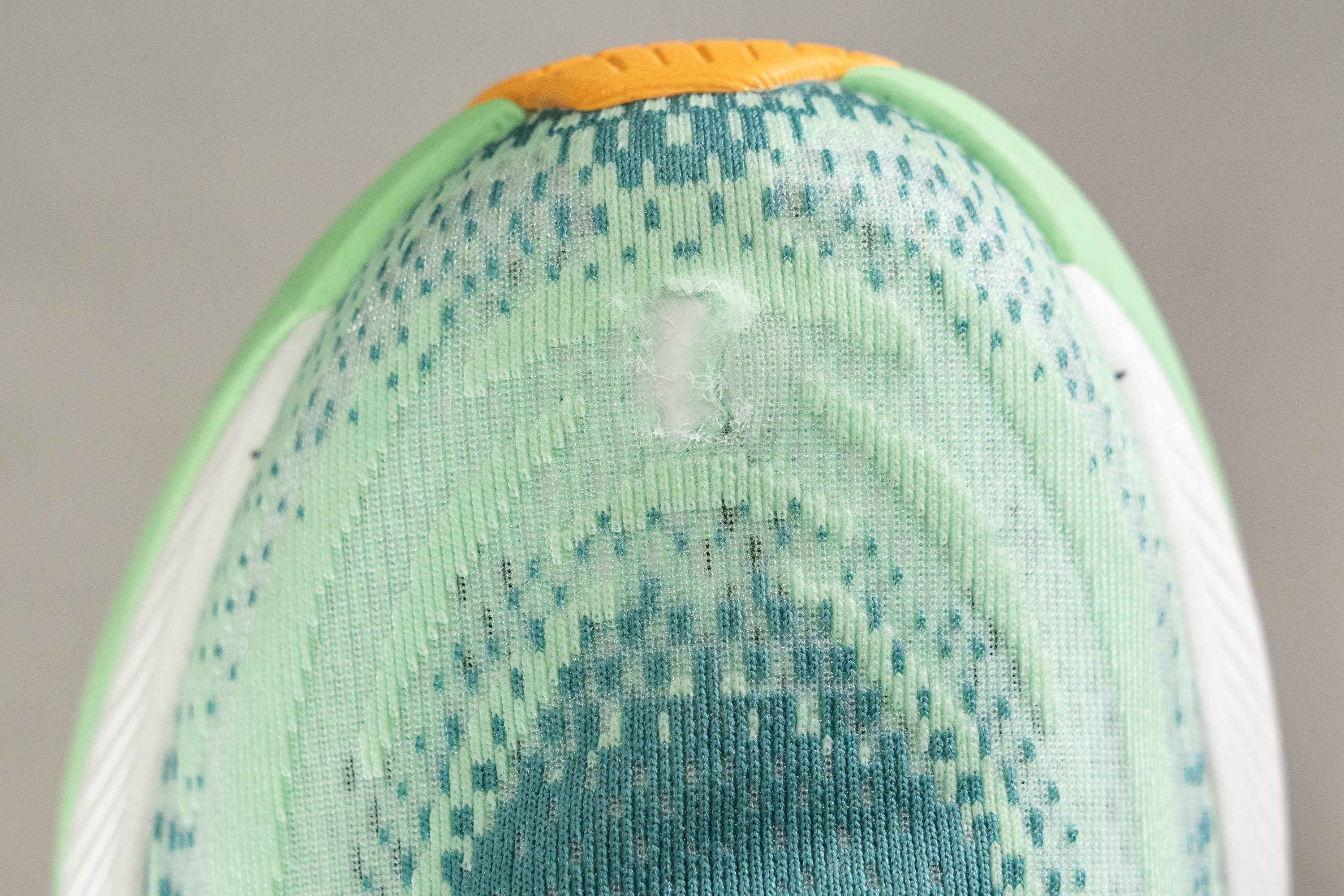
| Hoka Mach X | 1 |
| Average | 2.6 |
Heel padding durability
The story is similar for the heel. Hoka aimed for comfort, which often suggests a trade-off in abrasion resistance.
Once more, we had to give the Mach X a disappointing 1/5. It's evident that a revisit to new materials and innovative designs is essential in this area.
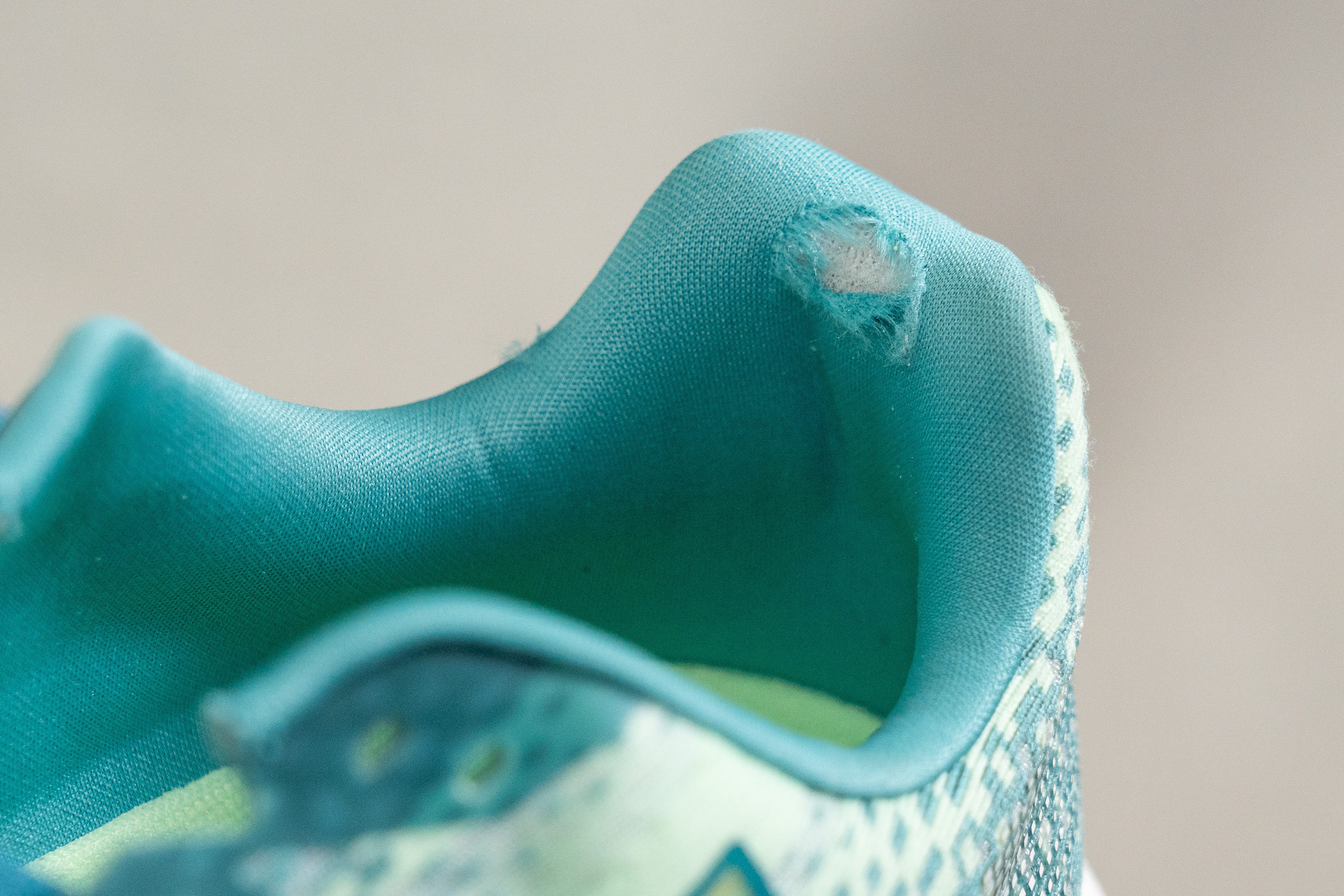
| Hoka Mach X | 1 |
| Average | 3.4 |
Outsole durability
The rubber does an exceptional job resisting wear. Following our recent Dremel test, we observed only a 0.4-mm indentation—an impressive outcome.
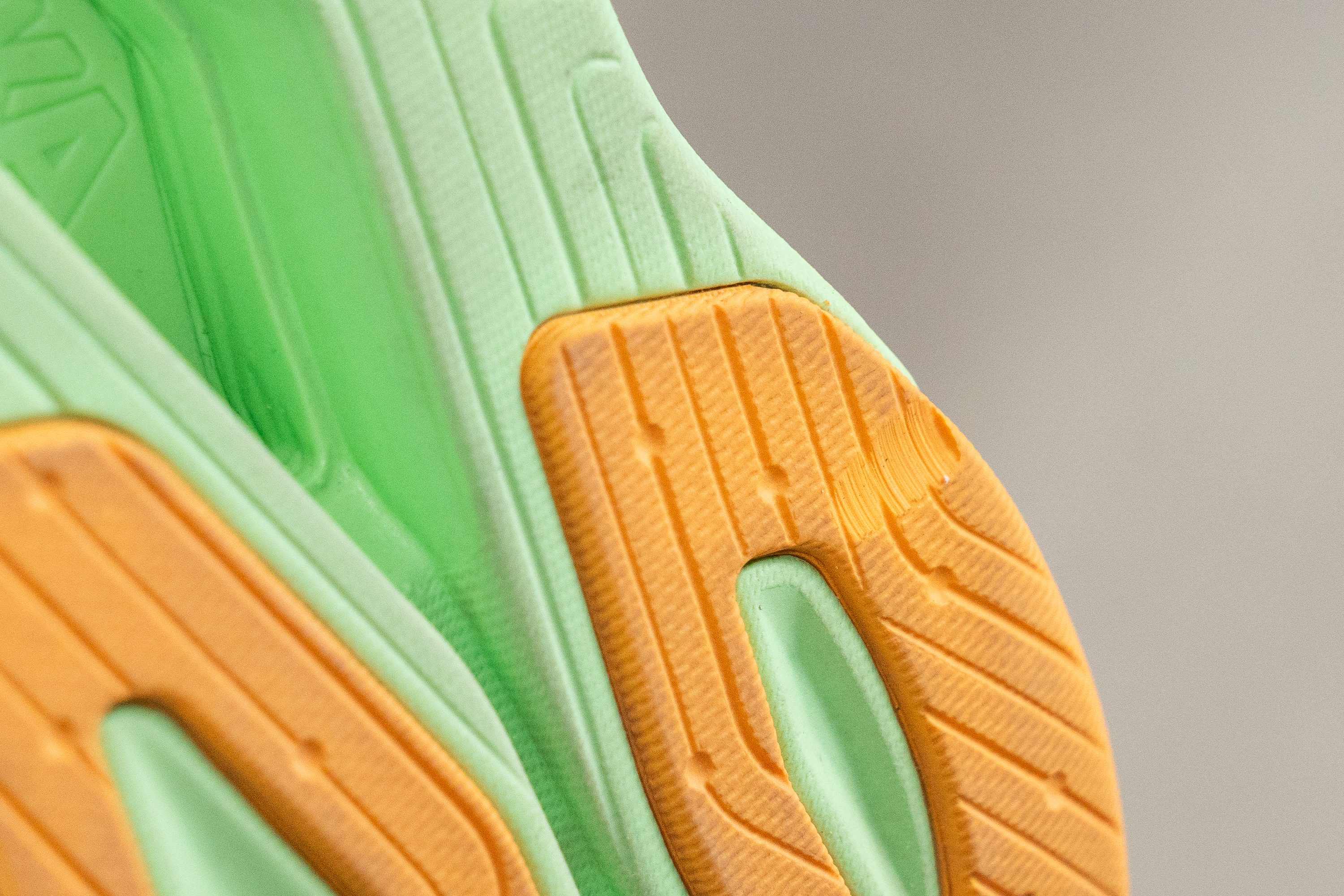
| Hoka Mach X | 0.4 mm |
| Average | 1.1 mm |
Outsole thickness
It's imperative that the rubber delivers top-notch performance—and it does. The Mach X, in its quest for lightness, features a thinner rubber (2.3 mm) compared to most shoes, alongside a considerable amount of exposed foam.
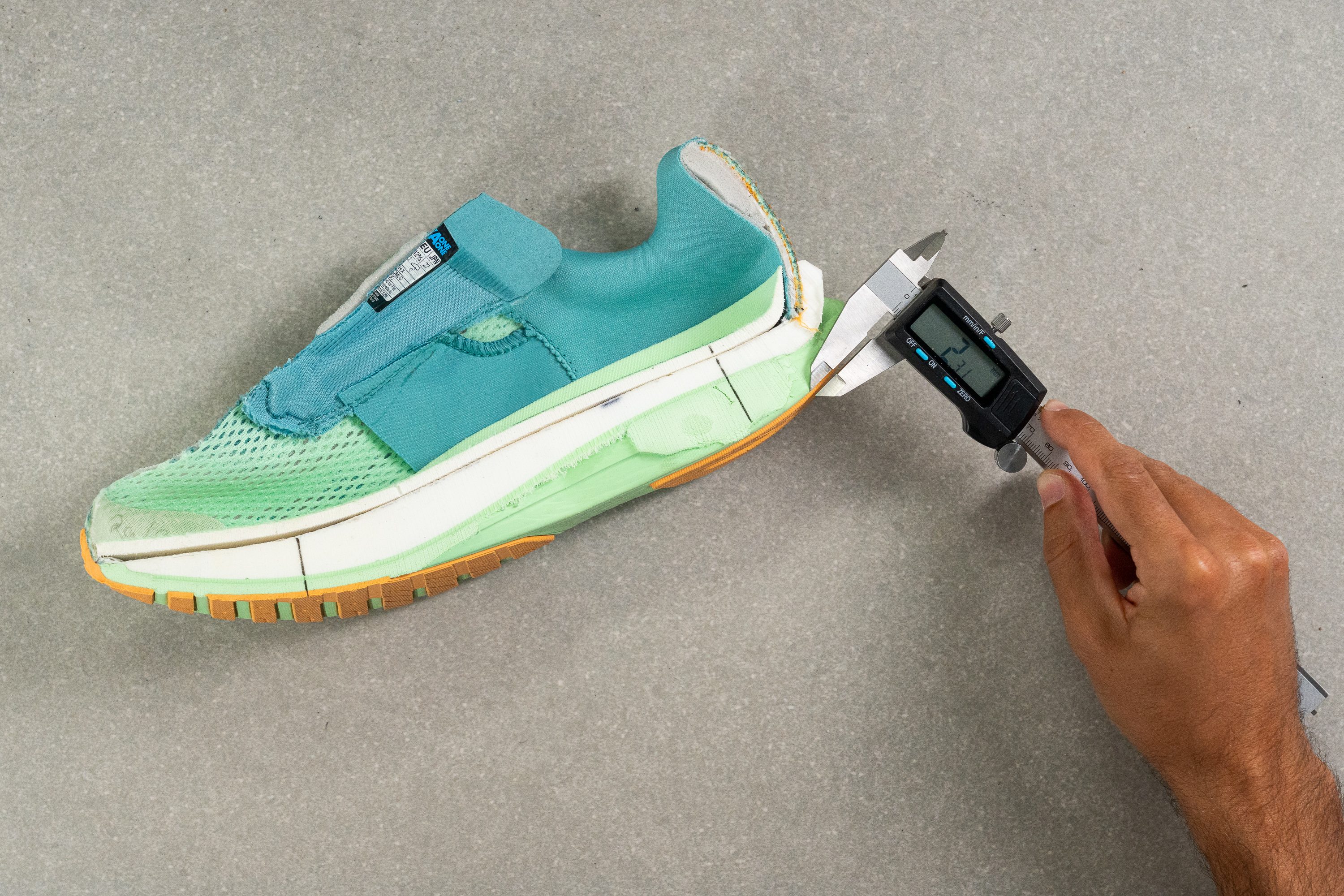
| Hoka Mach X | 2.3 mm |
| Average | 3.2 mm |
Misc
Insole thickness
The insole measures 4.5-mm in thickness. This is pretty standard and should fit the needs of any runner without adding extra weight.
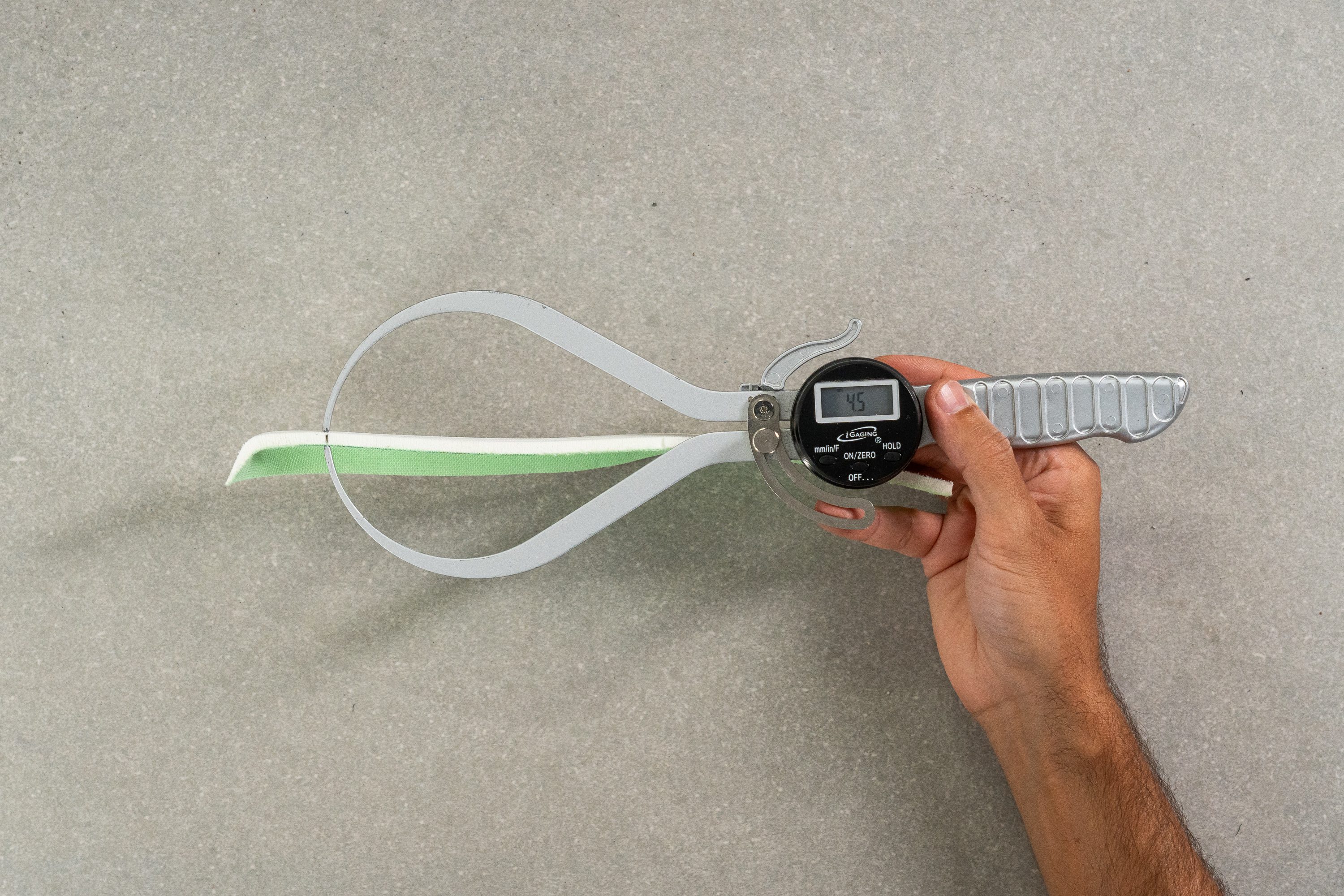
| Hoka Mach X | 4.5 mm |
| Average | 4.5 mm |
Removable insole
The insole of the shoe comes out smoothly, and we had no problems putting in personalized orthotics.
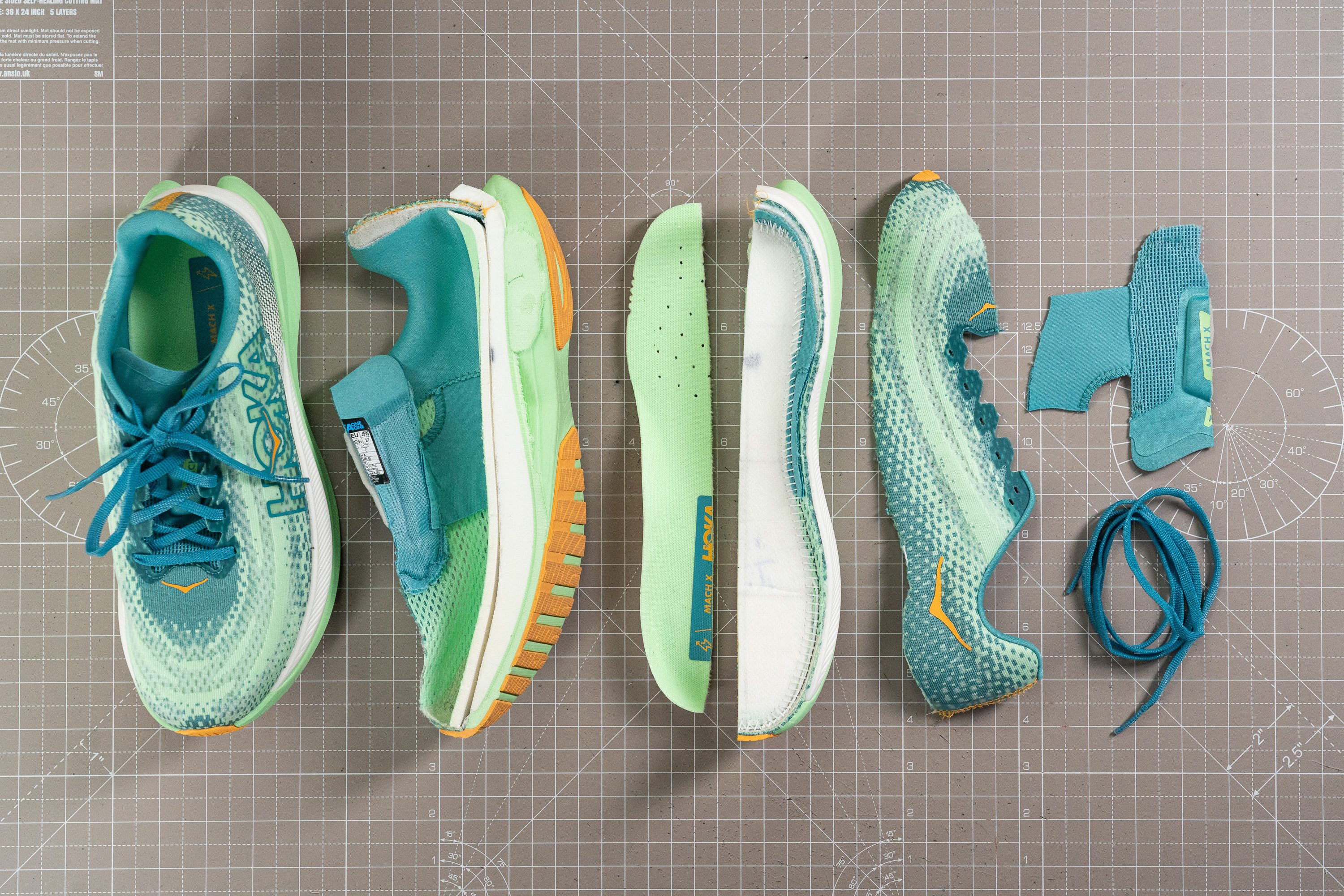
| Hoka Mach X | Yes |
Midsole softness in cold (%)
During cold-weather runs, the Pebax foam stays notably soft. After we placed the shoe in the freezer for 20 minutes, our measurements showed a cushy 14.3 HA.
Still, this is a 34.2% increase that we'll likely feel when running. It's not the performance we'd expect from a top-tier foam.
| Hoka Mach X | 34% |
| Average | 24% |
Tongue padding
With a thickness of 6.4 mm, the tongue boasts ample padding for a shoe of this type.
Runners who regularly deal with instep discomfort or lace bite will undoubtedly value this detail in a shoe that's not precisely a heavy daily trainer.
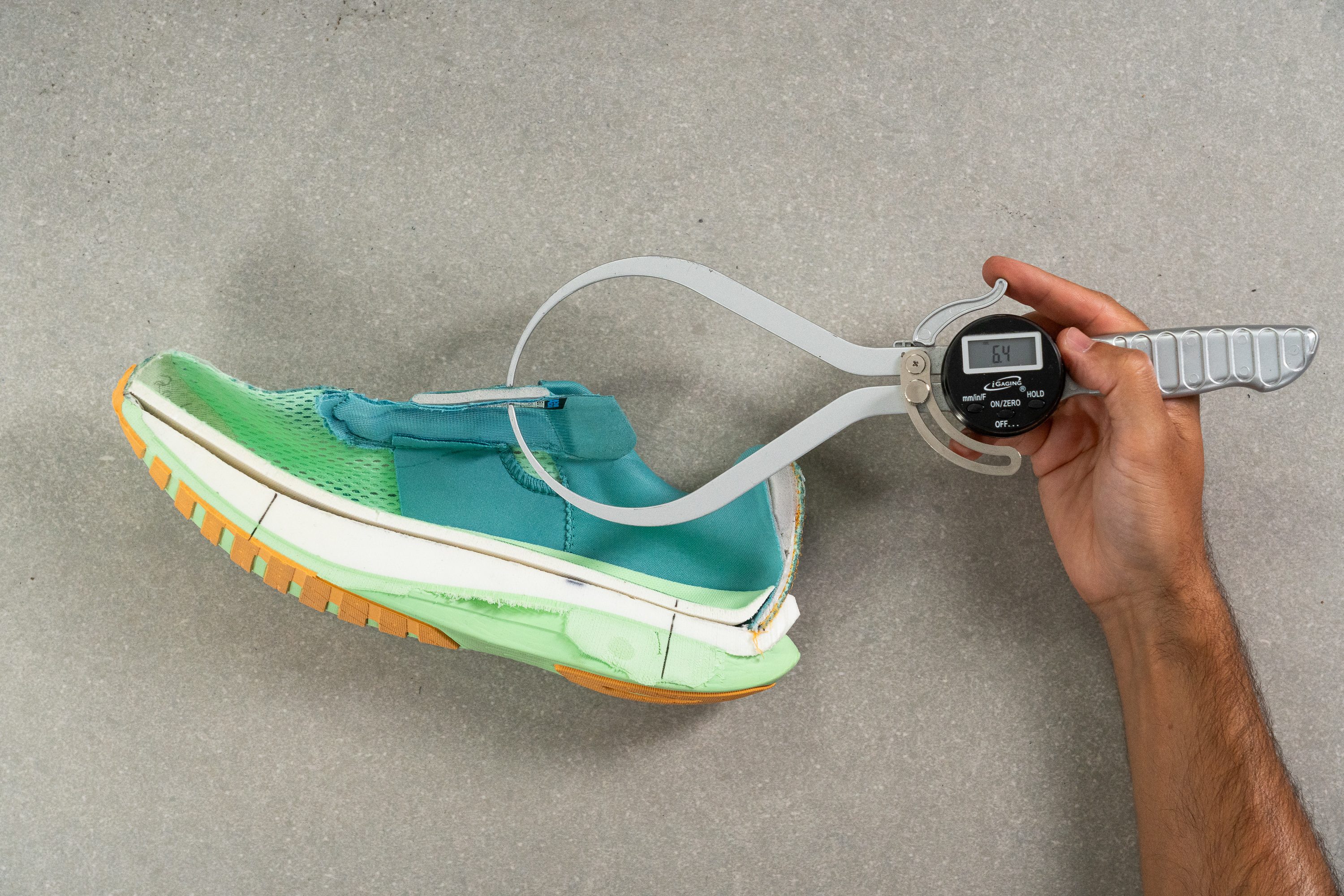
| Hoka Mach X | 6.4 mm |
| Average | 5.7 mm |
Tongue: gusset type
Hoka often features semi-gusseted tongues in their tempo training shoes. We genuinely love this design—it offers comfort without the pronounced feel of a fully-gusseted tongue.
Fortunately, the Mach X follows suit.
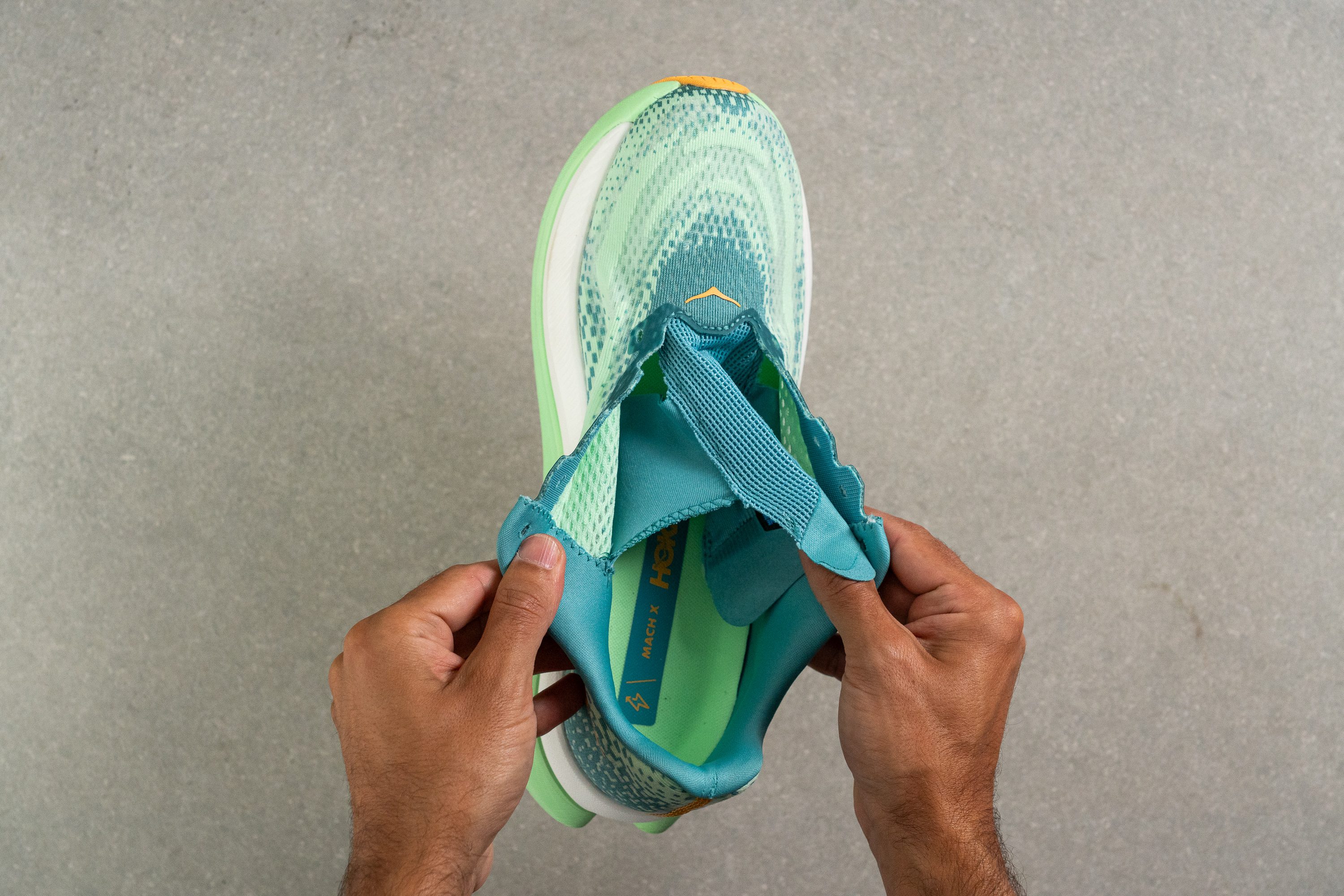
| Hoka Mach X | Both sides (semi) |

